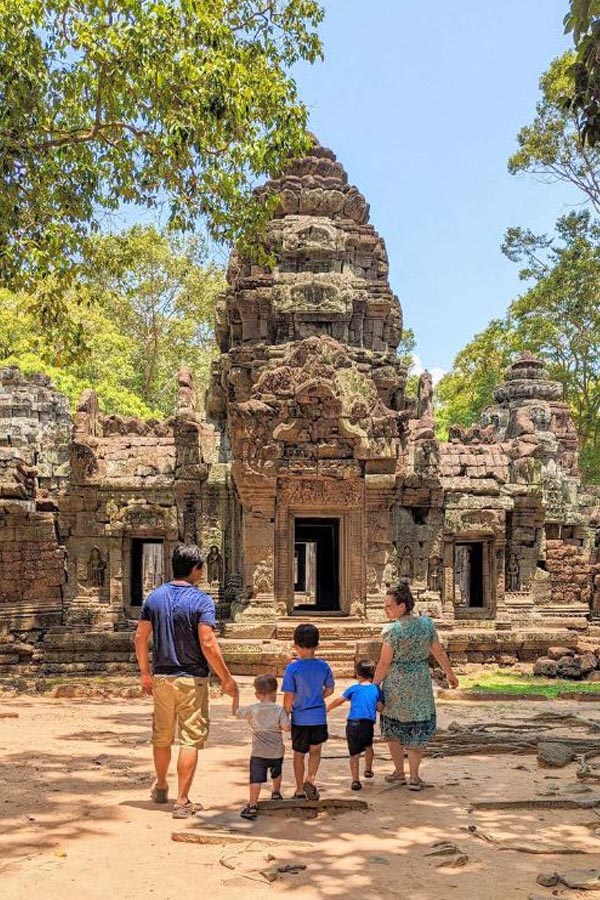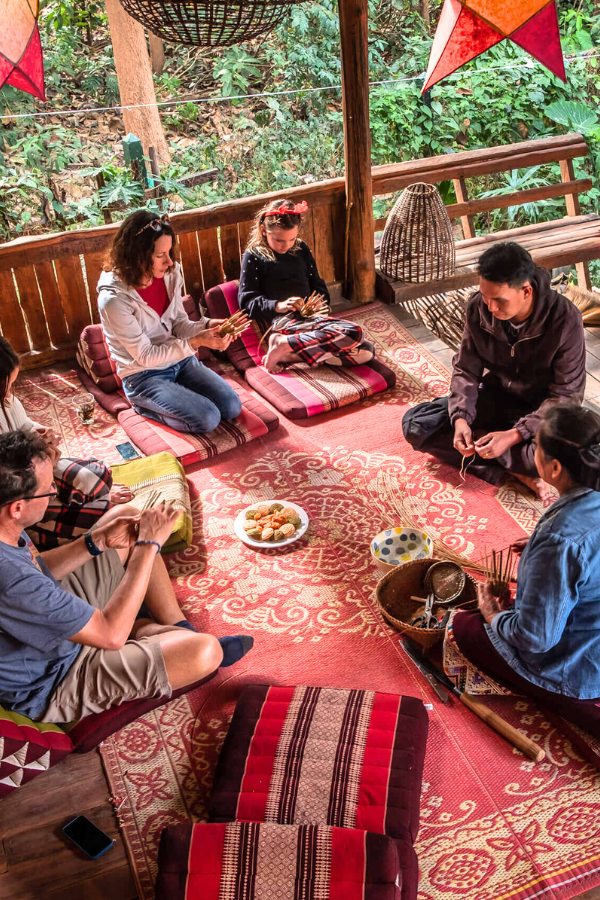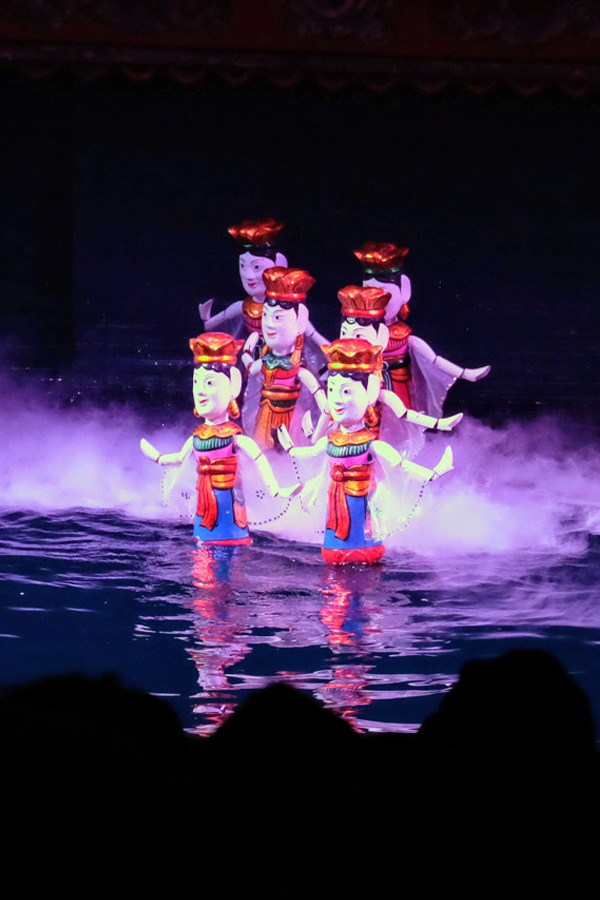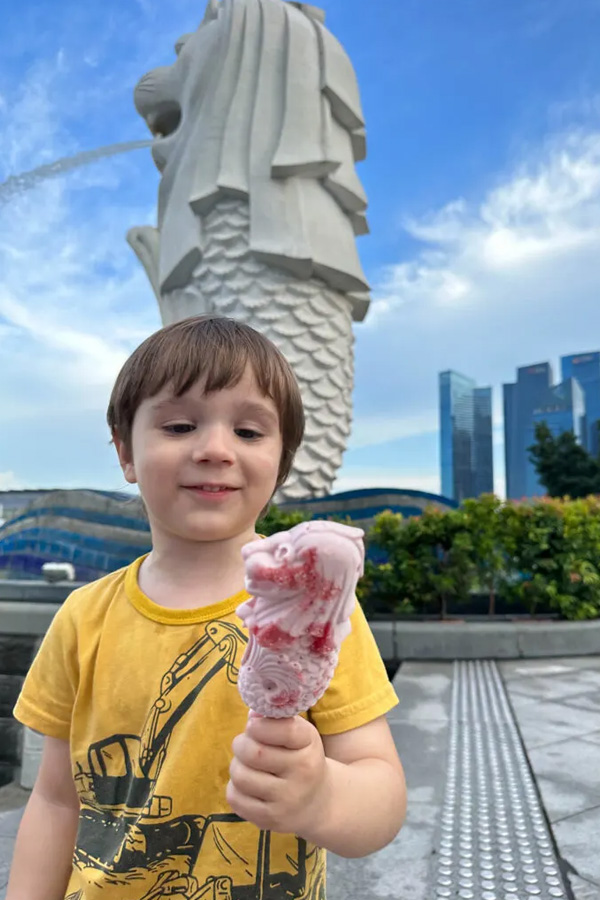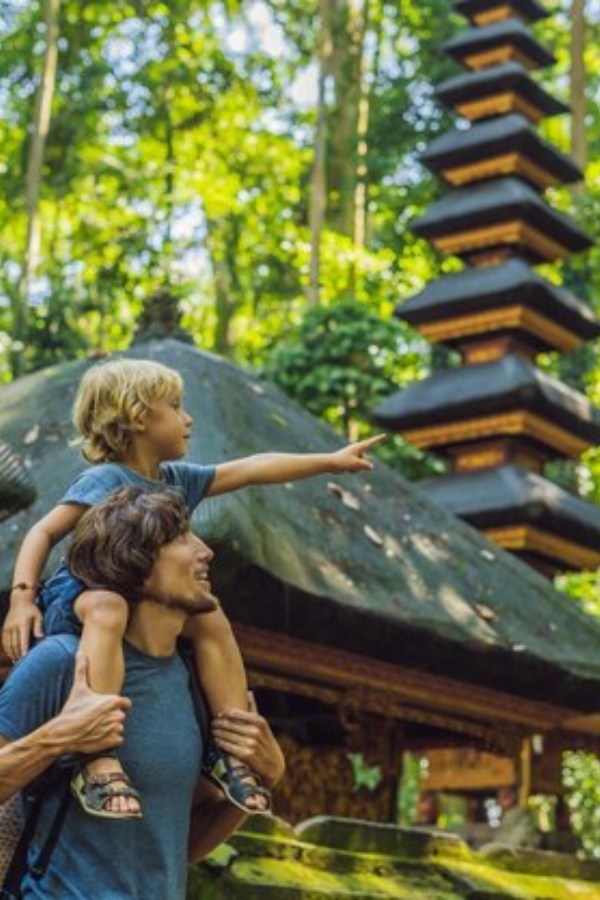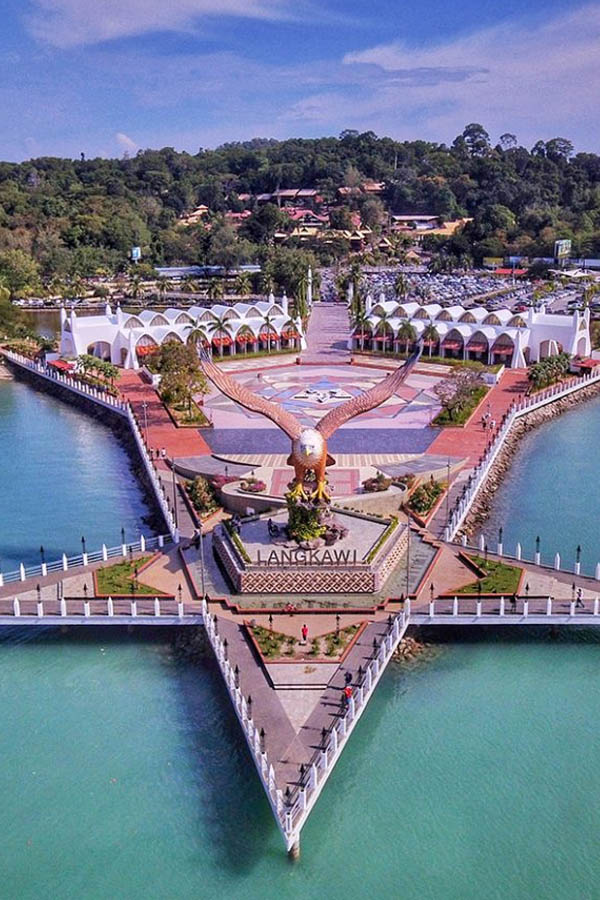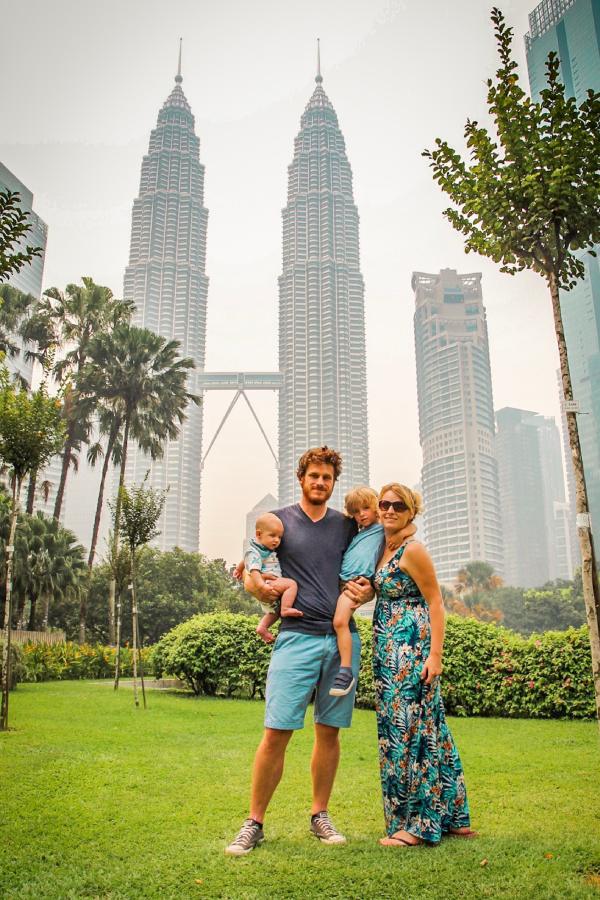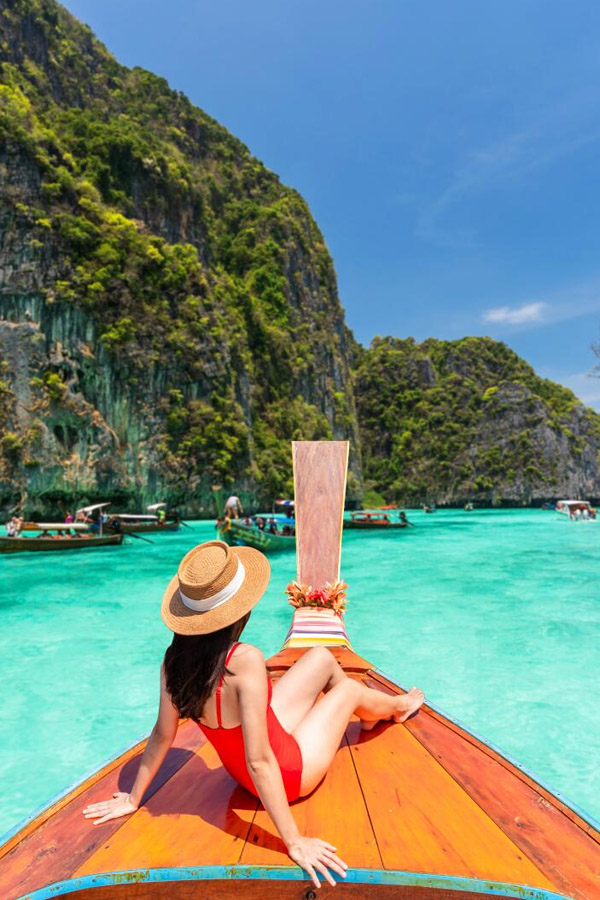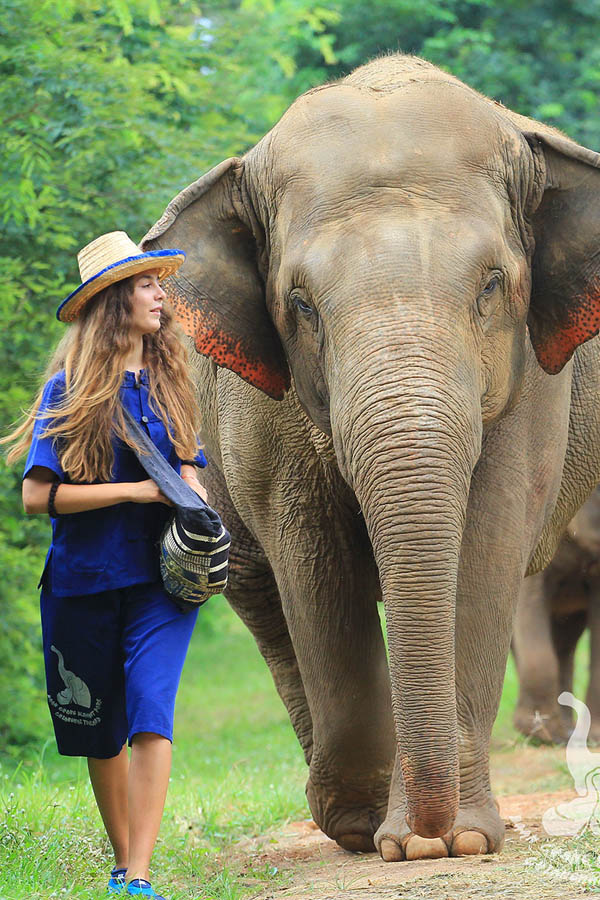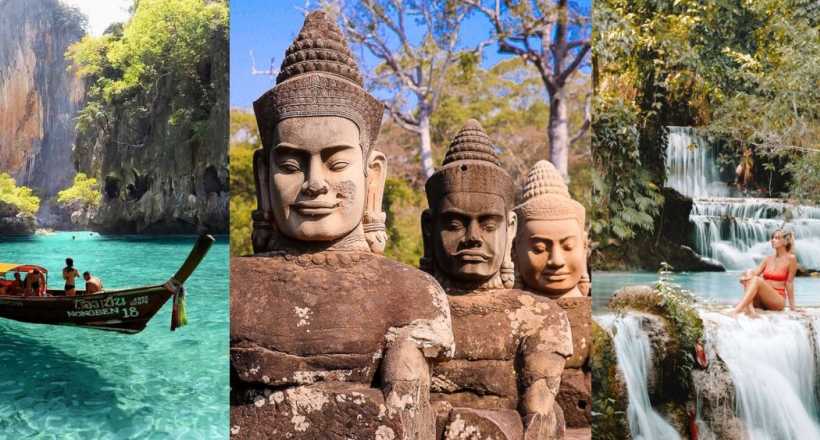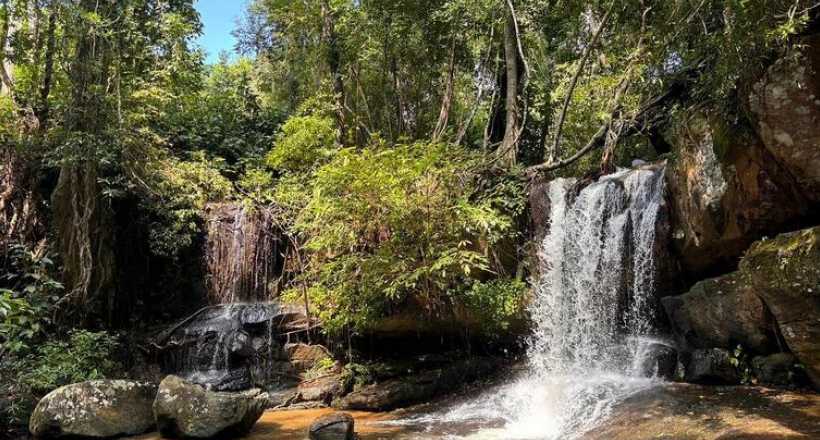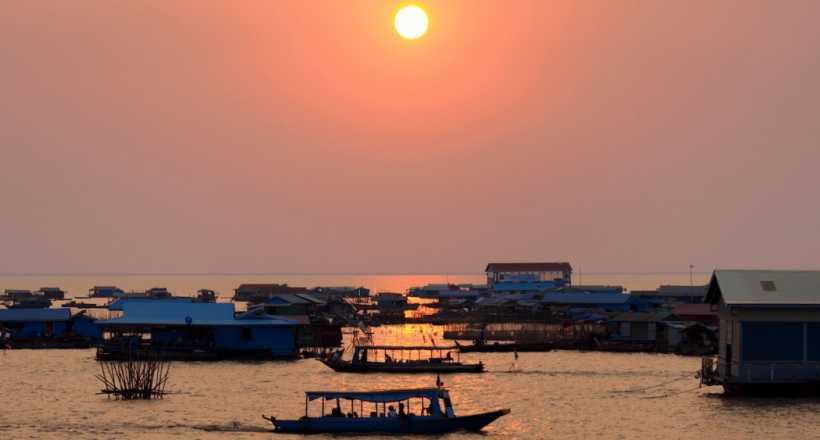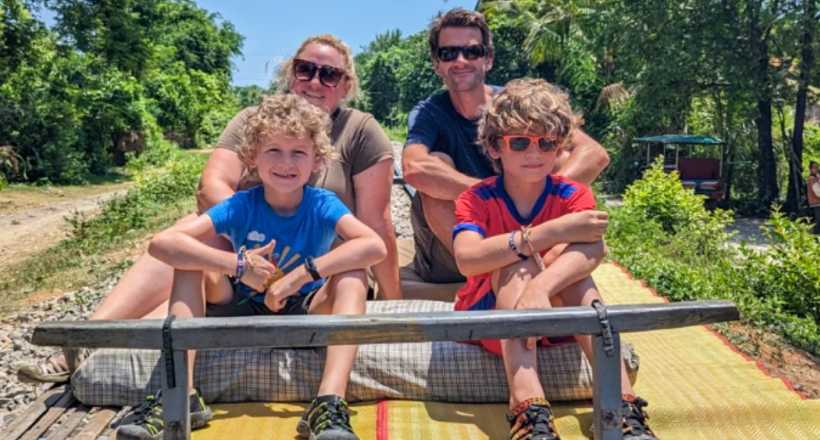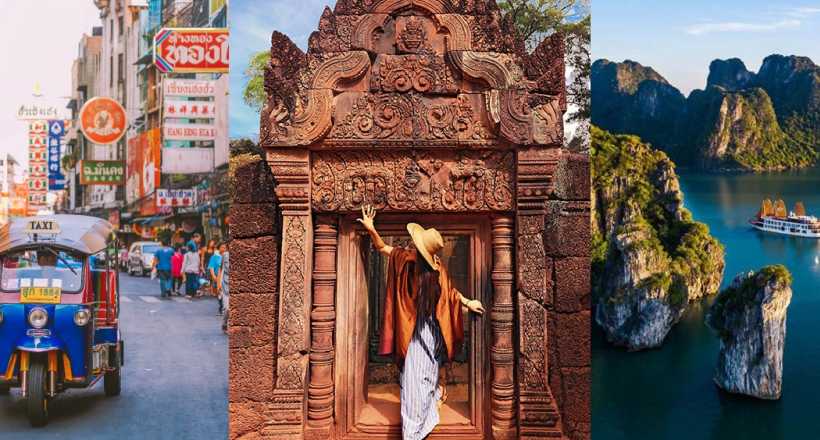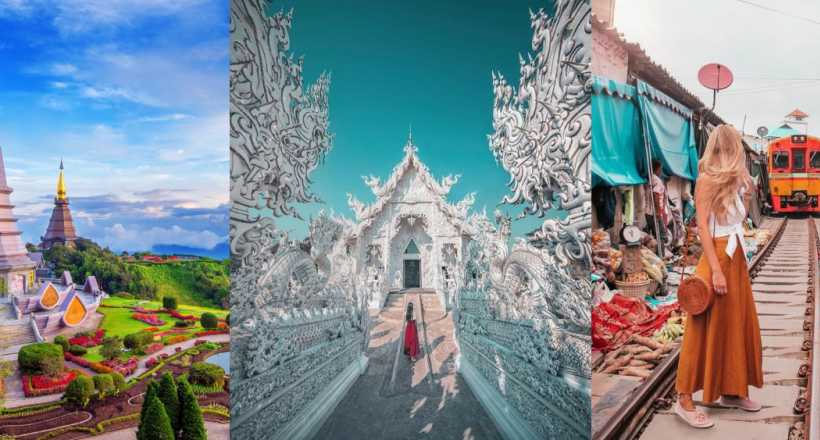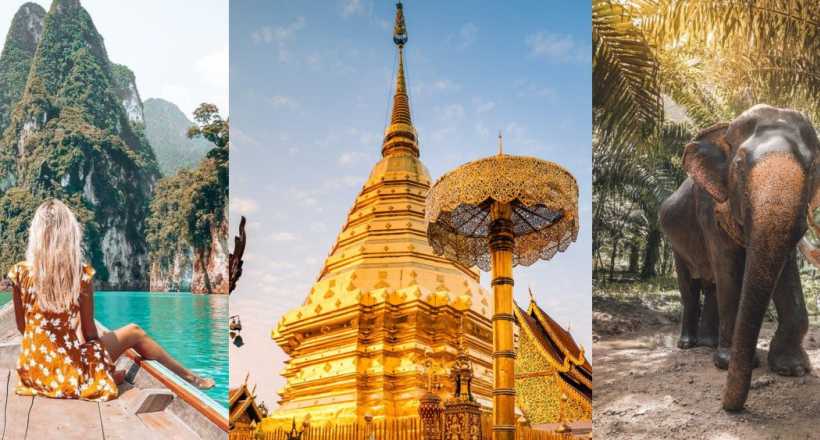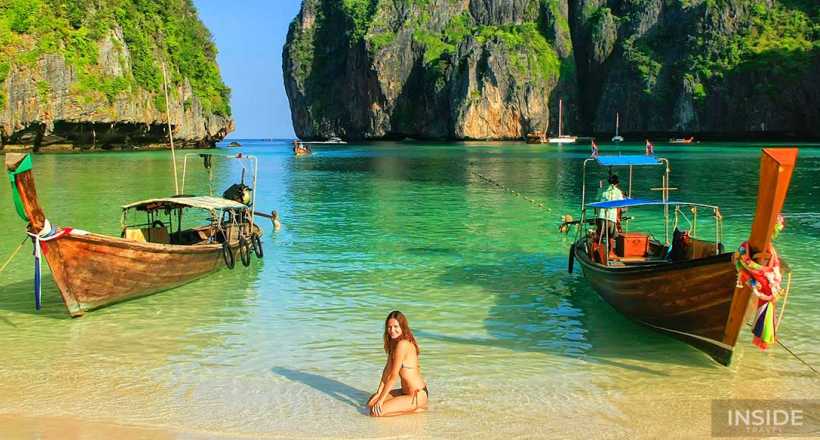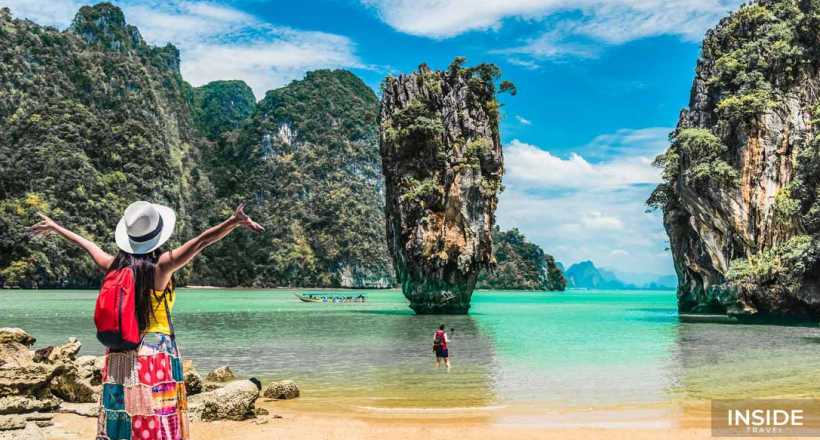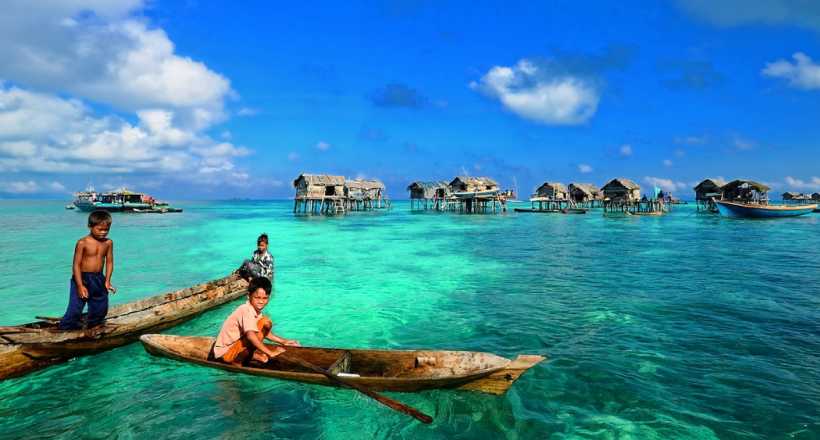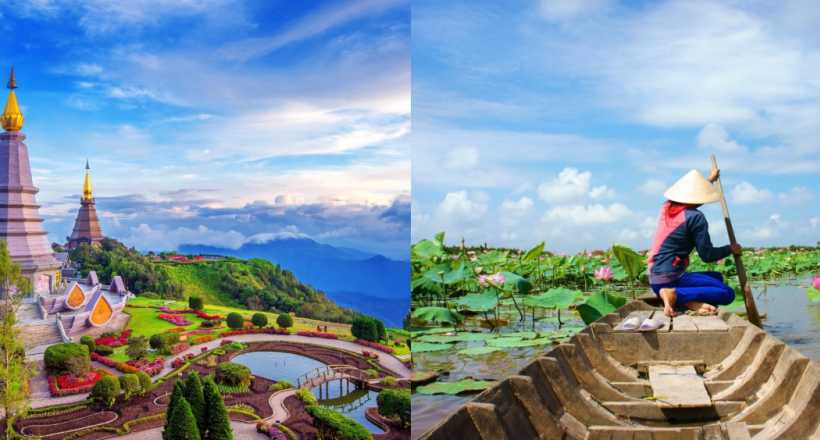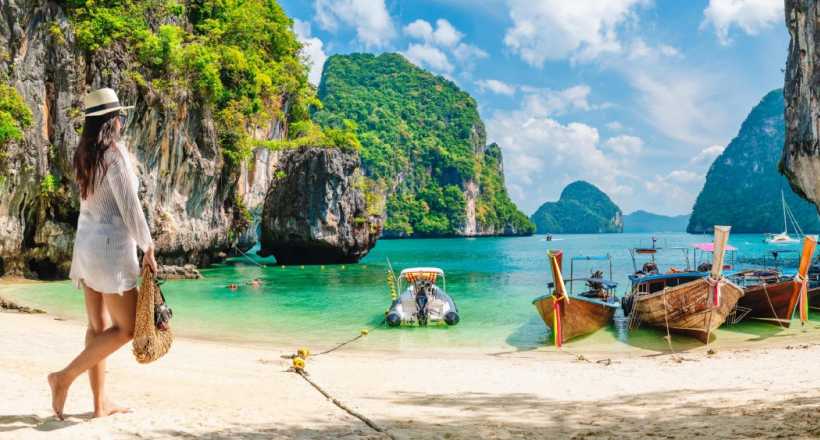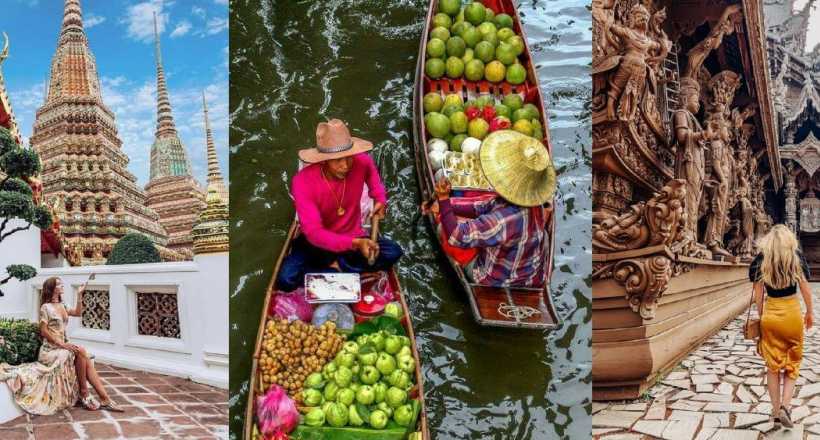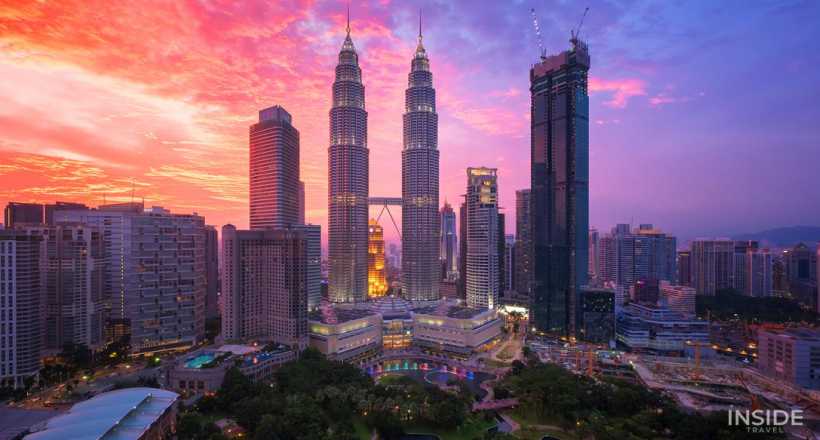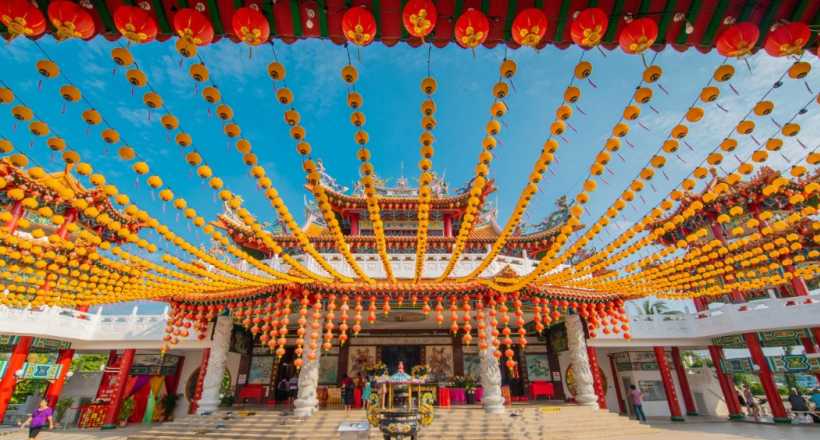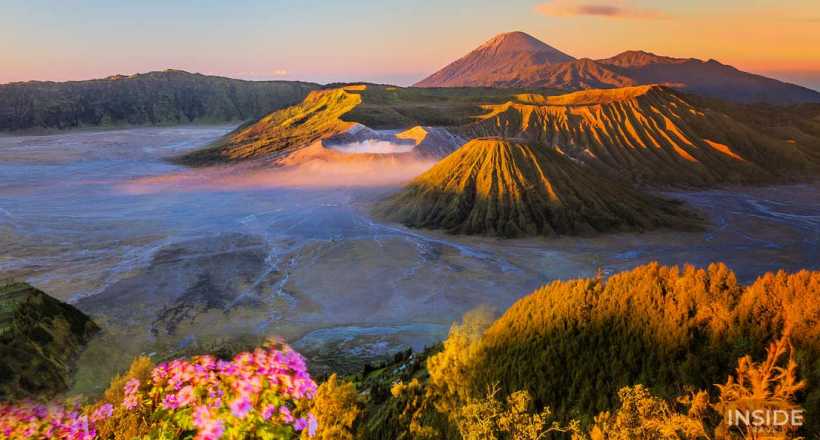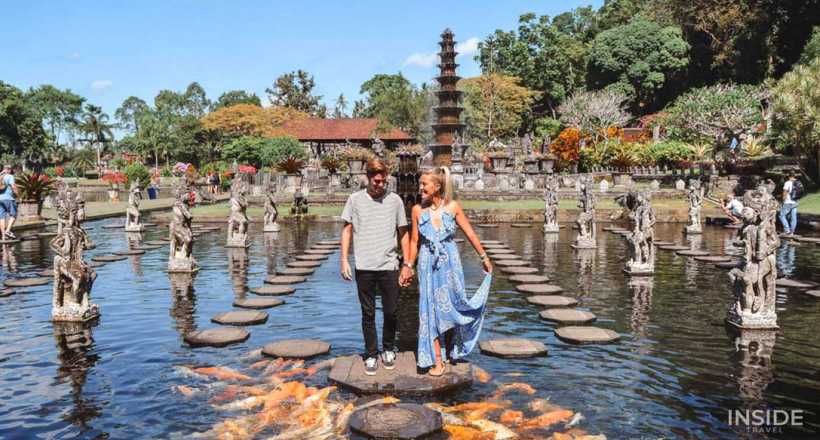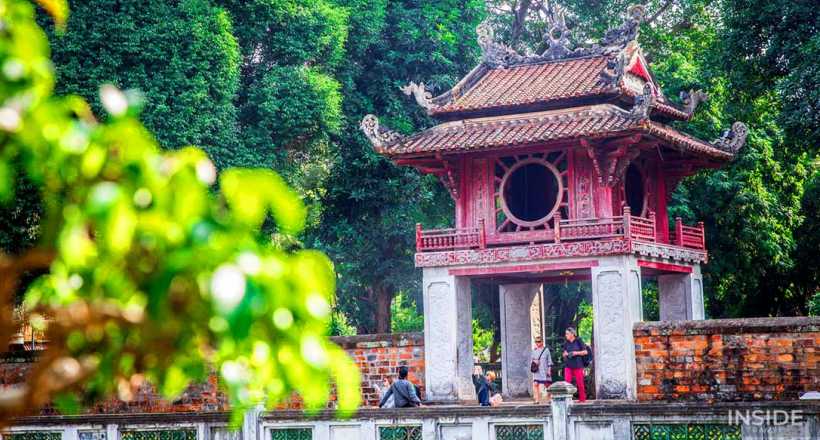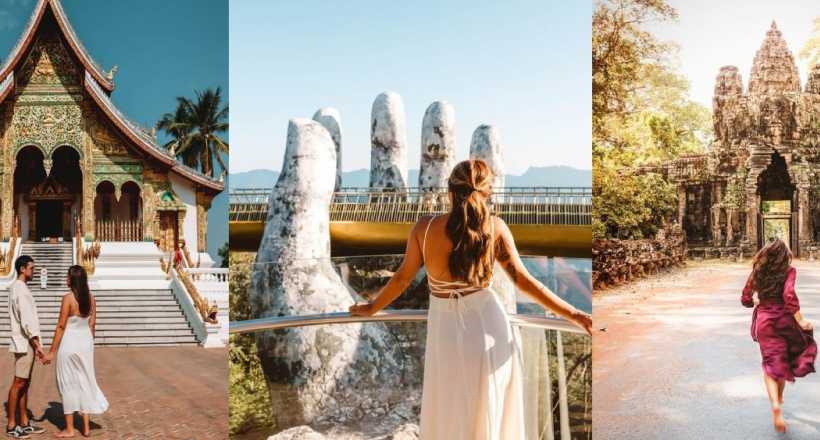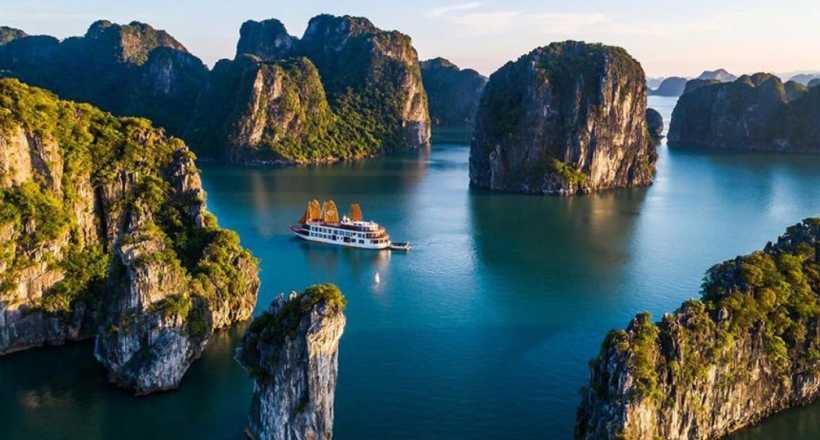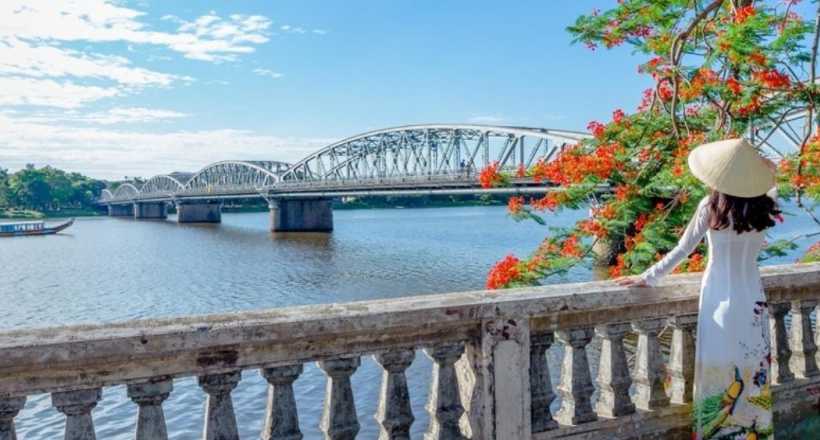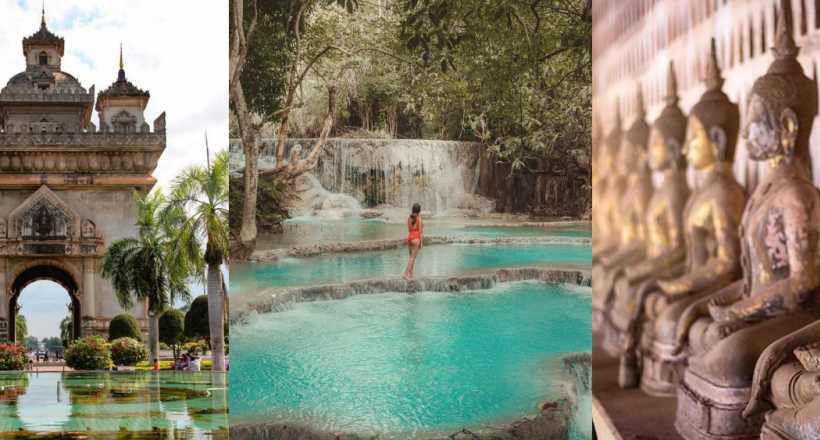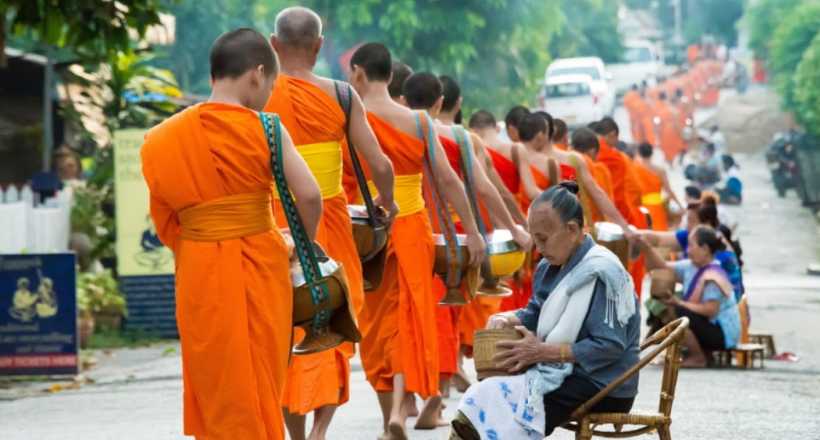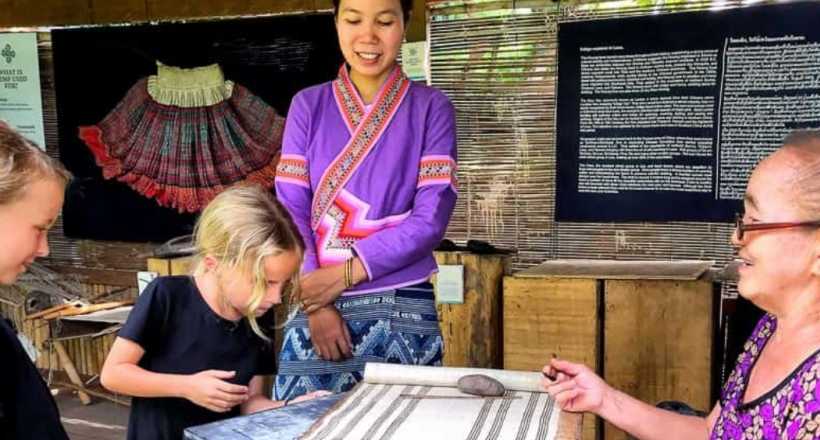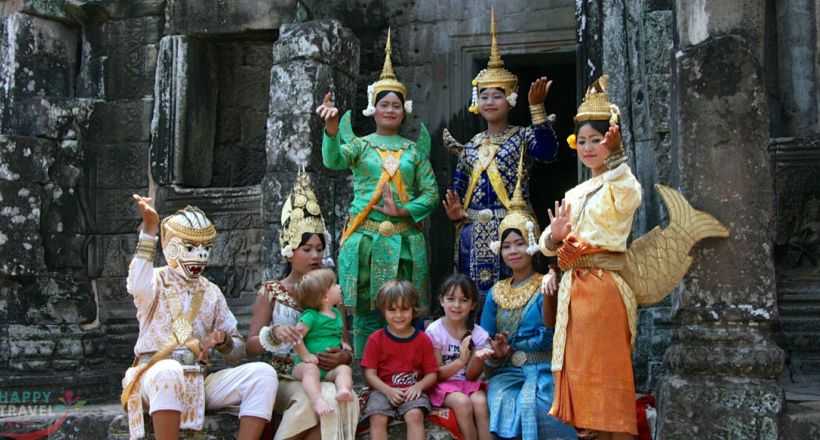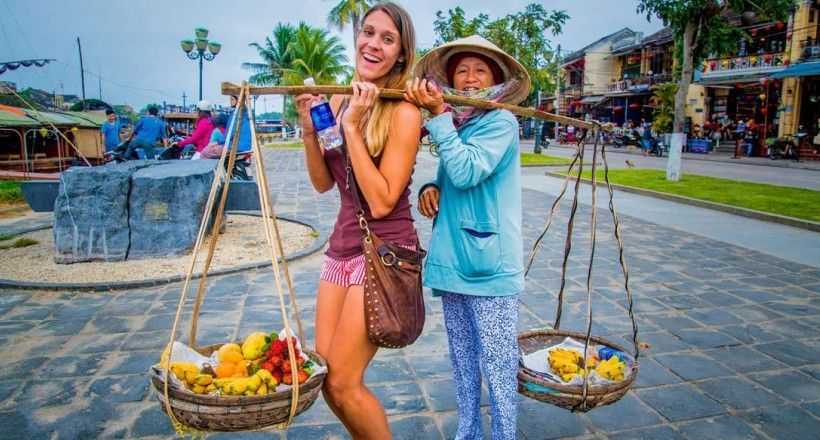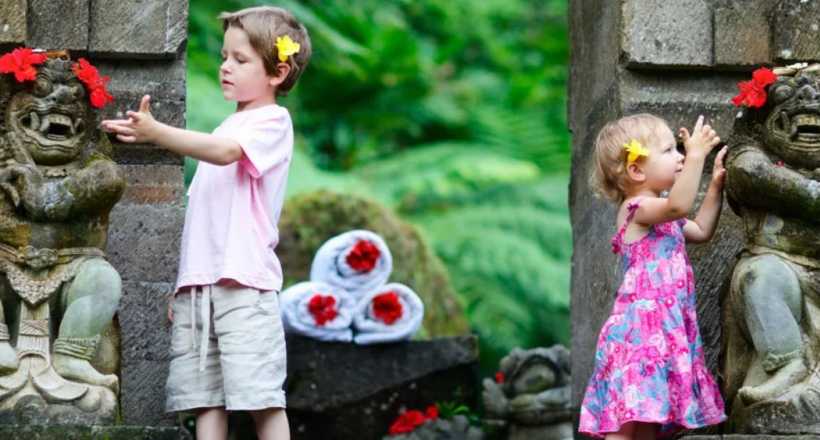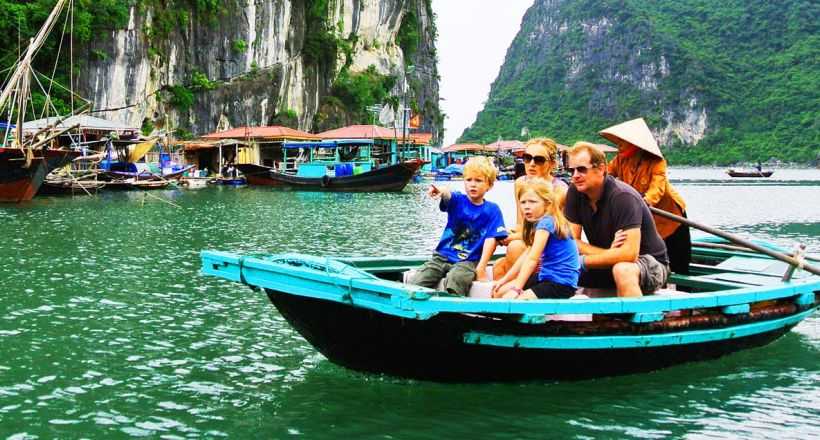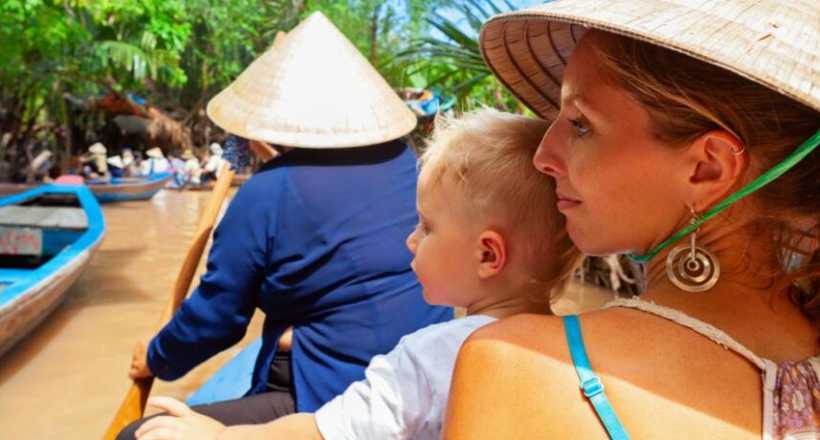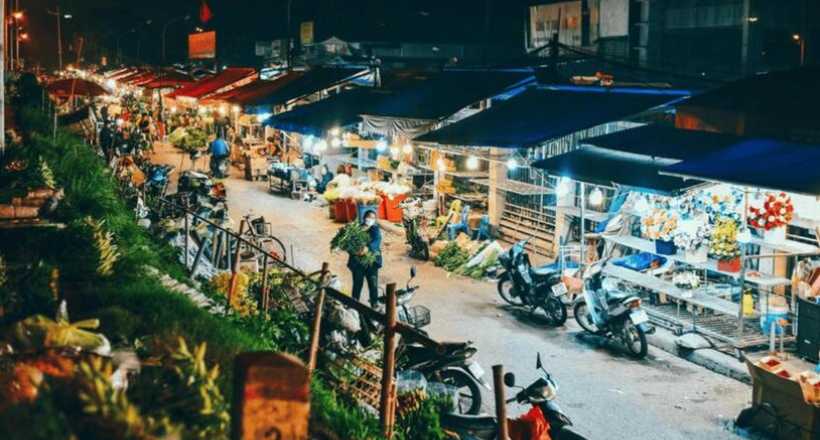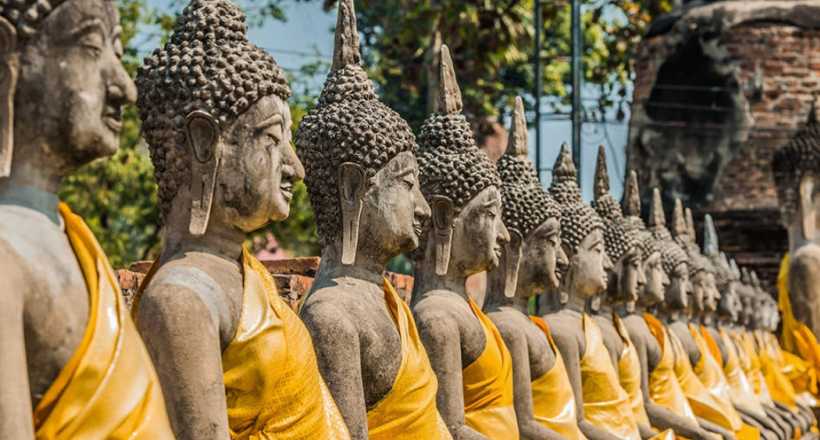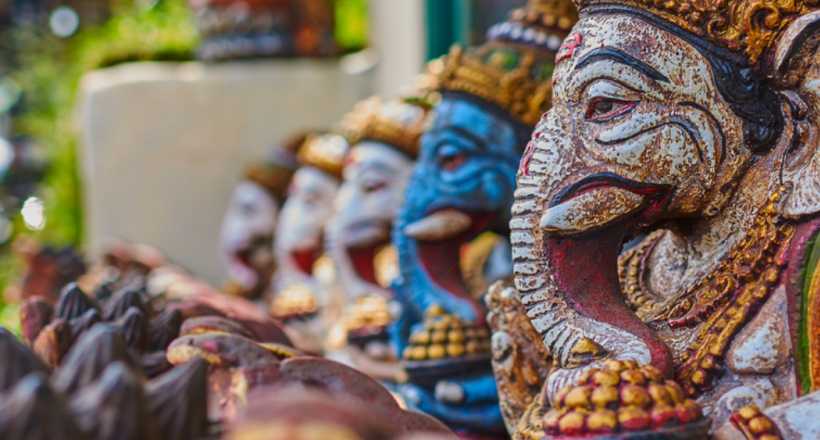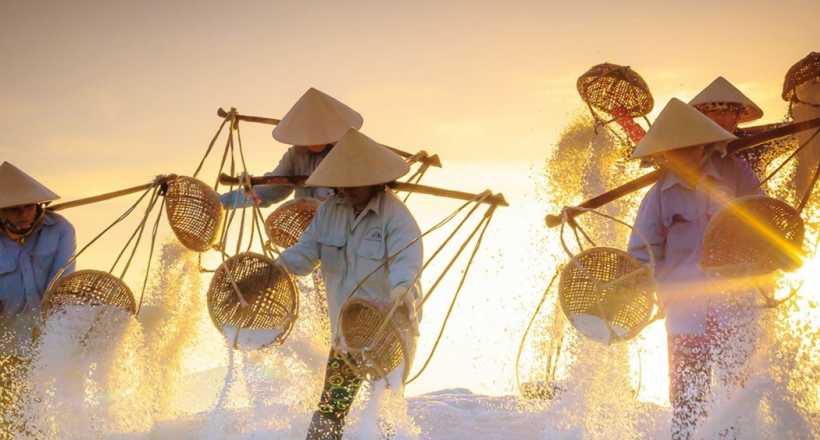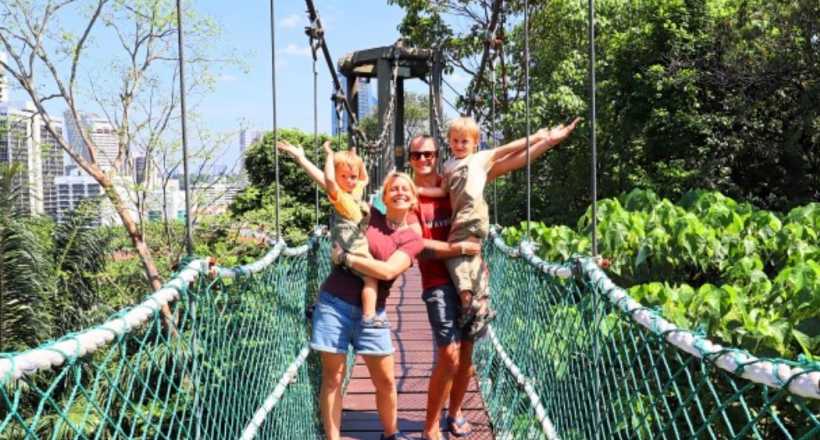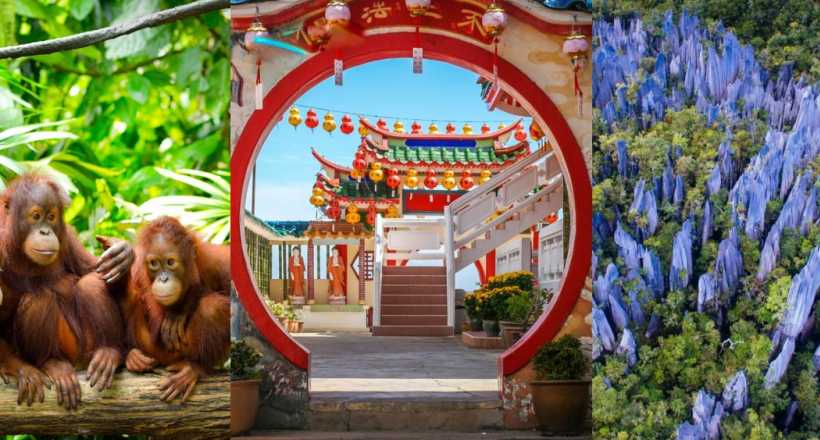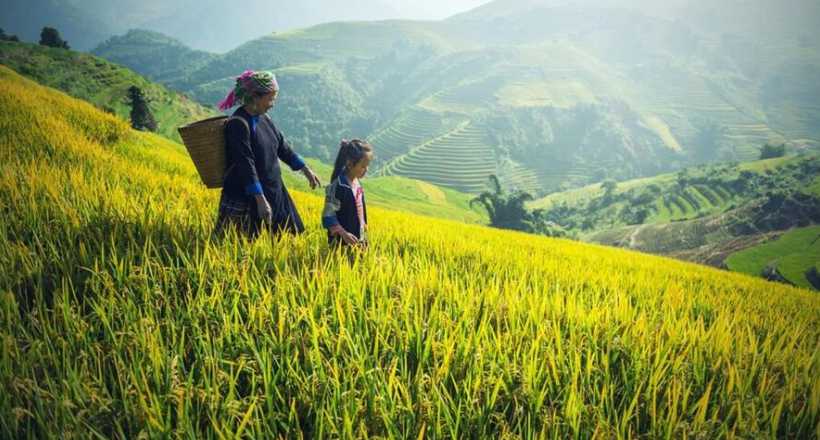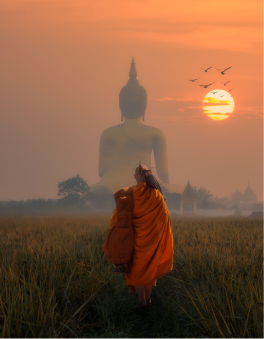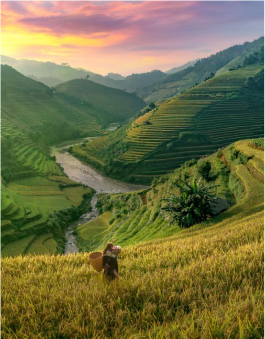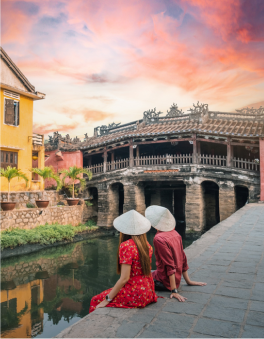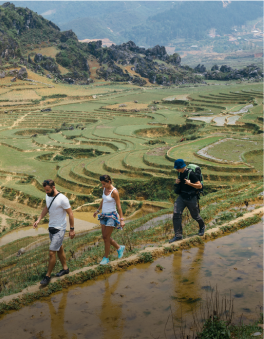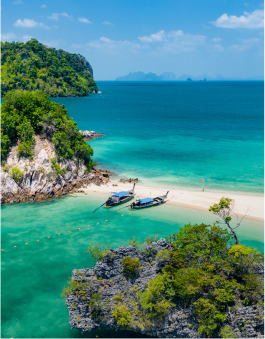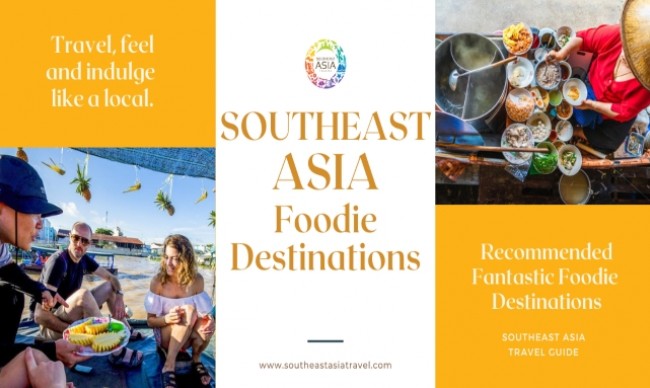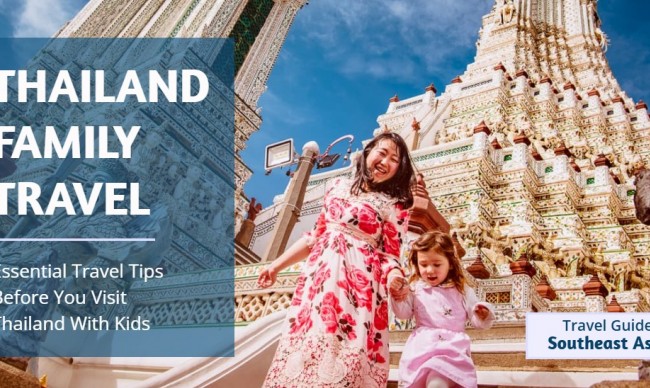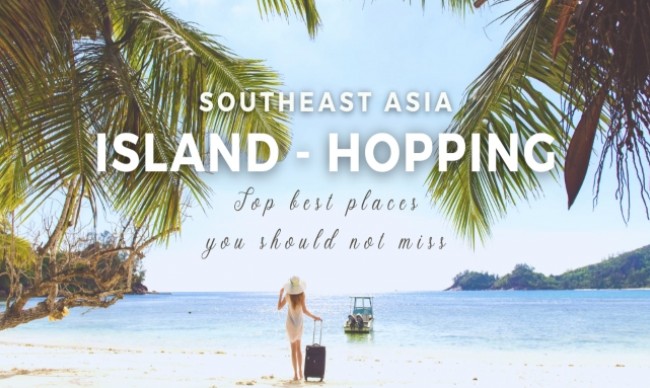


Southeast Asia Family Tours
We Customize Southeast Asia Family Tours By Your Way


CREATE YOUR OWN TRIP WITH US

What is Southeast Asia Family Tours?
Famed for the weird and wonderful wildlife on both land and sea, this is the place where children can see wild animals and multi-colored tropical fishes in their natural habitat. Orangutan safaris in Borneo and canopy walks in the rainforests of Malaysia all get rave reviews from younger children, along with visits to elephant camps, where families may help wash and feed rescued elephants. For older children, hiking, biking and canoeing trips are a great way to explore off-track areas, such as the wildlife reserves of Sarawak, or rural hinterlands around the Mekong Delta. Kids, of course, also love the elemental pleasures of staying close to remote beaches. Some of our favourites are in Thailand and Indonesia, where they can snorkel in transparent water, swim in shoals of multi-coloured fish and collect exotic shells.
Holding the tradition of sincere respect for family, Southeast Asia is a safe and friendly region for children. It is also an ideal destination for families to escape routine and engage with each other in real conversations and maximize family time together in fun activities that bring all the members together.
Southeast Asia Family Tours
What are Southeast Asia Family Tours?
Family tours are specially designed travel experiences that cater to the needs and interests of all family members, from young children to grandparents. These tours typically include a mix of cultural activities, nature excursions, kid-friendly attractions, and comfortable accommodations with family-focused amenities to create lasting memories while keeping everyone engaged and happy. The itineraries are usually paced more slowly, with built-in rest time and flexibility, ensuring that everyone in the family can enjoy the trip without feeling rushed or overwhelmed.
Southeast Asia is a perfect destination for family vacations due to its rich cultural heritage, diverse landscapes, warm climate, and friendly locals. Countries like Thailand, Vietnam, Cambodia, and Indonesia offer a wide range of activities and countless opportunities for fun and learning, suitable for children and adults alike. From exploring ancient temples and local markets to enjoying beach resorts and wildlife encounters, family tours in Southeast Asia stand out for their diversity, affordability, and enriching experiences. Tour operators also often include hands-on experiences like cooking classes, wildlife visits, and local crafts that both kids and adults can enjoy. With a perfect mix of adventure and culture, Southeast Asia is undoubtedly the top destination for families of all sizes.

Why choose Southeast Asia Family Tours?
Choosing a family tour in Southeast Asia means embracing a journey filled with discovery, connection, and joy. Whether you're building sandcastles on tropical beaches, uncovering ancient history, or savoring exotic flavors, the region delivers rich experiences that bring families closer together. Here are the top reasons why Southeast Asia is an ideal choice for your next family tour.
Diverse and Family-Friendly Destinations in Southeast Asia
From the white-sand beaches of Thailand and Indonesia to the ancient temples of Cambodia and Vietnam, Southeast Asia offers a broad spectrum of destinations that cater to all ages. Families can relax on the beaches of Bali, explore rice terraces in northern Vietnam, or take a boat ride through the Mekong Delta. Each country brings a unique flavor, making it easy to combine both relaxation and education in a single trip. Many cities and attractions are equipped with family-friendly amenities, including kid-friendly menus, comfortable accommodations, and engaging activities that make traveling with children enjoyable.
Educational and Cultural Immersion in Southeast Asia Family Tours
Traveling in Southeast Asia is not only fun but also deeply enriching. Children and parents alike can learn about centuries-old traditions, from Buddhist practices in Laos to royal customs in Thailand. Visiting ancient wonders like Angkor Wat in Cambodia or participating in traditional craft workshops in Vietnam provides hands-on learning opportunities that are both fascinating and memorable. These experiences help children develop a greater appreciation for different cultures, histories, and ways of life, turning a vacation into a powerful educational journey.
Southeast Asia Family Tours Offer Affordable Travel Options
Compared to many Western or developed countries, Southeast Asia offers excellent value for money. Affordable accommodation, transportation, meals, and activities make it possible for families to enjoy extended stays or luxurious experiences without breaking the bank. From beach resorts to cozy homestays and boutique hotels, you’ll find quality options at a fraction of the cost you might pay elsewhere. This affordability allows families to do more—visit more destinations, try more experiences, and create more memories together.
Warm Hospitality and Welcoming Cultures
One of the most remarkable aspects of Southeast Asia is the genuine hospitality of its people. Children are warmly welcomed, and families often find themselves treated with special kindness in restaurants, markets, and hotels. Locals frequently go out of their way to assist travelers, especially those with young kids. This warmth and friendliness can make a significant difference, particularly for first-time international travelers or those concerned about language and cultural barriers.
Exciting Adventures and Activities
Southeast Asia offers a wide range of adventure activities suitable for families. Whether it's snorkeling in the Philippines, zip-lining through the rainforests of Laos, elephant sanctuaries in Thailand, or cycling through rural villages in Cambodia, there's always something exciting for active families. Many tour operators also offer customized itineraries that are age-appropriate and flexible, ensuring that both young children and teens are engaged and entertained throughout the trip.
Delicious and Varied Cuisine During Southeast Asia Family Tours
Food in Southeast Asia is a feast for the senses—and an adventure in itself. From Thai curries to Vietnamese pho, Indonesian satay to Malaysian laksa, the region’s cuisine is delicious, healthy, and diverse. Many dishes can be made mild or customized for younger palates, and cooking classes are often available for families who want to learn how to make their favorite dishes. Street food is also a popular, safe, and inexpensive way to sample a wide array of flavors, often turning a simple meal into a cultural discovery.

Best time to take Southeast Asia Family Tours
Southeast Asia is a year-round destination full of vibrant cultures, stunning landscapes, and family-friendly adventures. However, planning the perfect family tour in Southeast Asia depends heavily on timing. Climate, festivals, school holidays, and crowd levels can all impact your experience. Understanding the best times to visit can help you make the most of your Southeast Asian journey with children in tow.
Dry Season: Ideal for Outdoor Adventures (November to April)
The dry season, generally spanning from November to April across most of Southeast Asia, is considered the best time for family travel. Countries like Thailand, Vietnam, Cambodia, Laos, and Myanmar enjoy pleasant weather with sunny days and cooler temperatures, making it perfect for beach outings, nature hikes, temple visits, and cultural explorations.
This season is particularly great for outdoor-loving families. You can enjoy kayaking in Halong Bay, snorkeling in the Andaman Sea, or visiting the temples of Angkor Wat without worrying about sudden downpours. Since the skies are clearer and the air is less humid, it’s also a great time for photography and long sightseeing days with children.
Shoulder Seasons: Fewer Crowds, Lower Prices (May, September, and October)
If you prefer to avoid large tourist crowds and take advantage of better deals, the shoulder seasons—right before and after the peak months—can be ideal. May, September, and October often see fewer visitors but still offer fairly good weather in many regions. This is a great option for families who want a more relaxed, budget-friendly travel experience.
During these months, you’ll find better availability in hotels, more personalized attention from tour guides, and less crowded attractions. While there may be occasional showers, they’re usually brief and don’t significantly disrupt travel plans. It's a smart compromise between price, comfort, and convenience.
Festival Seasons: Cultural Immersion and Family Fun
Southeast Asia is known for its colorful festivals, many of which are excellent opportunities for families to engage with local culture. Traveling during major celebrations like Songkran (Thai New Year in April), Tet (Vietnamese New Year, usually in late January or early February), or Loy Krathong (the Thai lantern festival in November) offers a magical and educational experience for kids.
While festivals bring crowds and higher prices, they also create unforgettable moments. Watching fireworks light up the sky, joining water fights, or making offerings with locals introduces children to meaningful cultural traditions and creates lasting memories.
Green Season: Budget Travel and Lush Scenery (June to October)
The so-called "green season" or rainy season—especially in countries like Cambodia, Laos, and Thailand—typically runs from June to October. While some may shy away from travel during this time, it's worth considering if your family is looking for great value and can tolerate some occasional rain.
Rain usually comes in short bursts, often in the late afternoon or evening, leaving plenty of time for sightseeing and indoor attractions like museums, aquariums, or cooking classes. The landscapes during this time are especially lush and beautiful, with rice fields and jungles at their most vibrant. Hotel and tour prices are also lower, making it easier to enjoy a high-quality trip on a budget.
Consider School Holidays and Family Schedules
Of course, the best time for your family may depend on school holidays and work schedules. The Christmas and New Year period (December–January) and summer break (June–August) are popular with families, though these are also peak travel times. Booking early during these months is essential, as flights and accommodations can fill up quickly.
For families with flexible schedules or young children not yet in school, traveling in the off-season or shoulder season is often more rewarding. You’ll enjoy better deals, fewer crowds, and a more relaxed pace.

What you can expect from Southeast Asia Family Tours
- Share a wonderful adventure with your kids as you explore the capital Hanoi’s fascinating heritage and historic sites, including the Ho Chi Minh Complex, the One Pillar Pagoda, the Temple of Literature, the Museum of Ethnology, etc.
- Experience the vibrant atmosphere of Vietnam’s capital city at night and grab a chance to taste mouthwatering local street food around Hanoi Old Quarter, such as Banh Cuon, Bun Cha, Banh My, Che, and Nom.
- Enjoy a traditional Water Puppet Show, a unique puppetry performance that tells interesting stories about the countryside of Vietnam in the past with authentic wooden puppets, a talented troupe of musicians, and puppet masters.
- Combine scenic sightseeing with family adventure when exploring the action-packed Ba Na Hills, see the amazing panoramic views of Danang city from the impressive Golden Bridge, and join plenty of games at Fantasy Park.
- Enjoy wonderful family moments by taking an exciting overnight Halong Bay cruise program with a variety of family-oriented outdoor activities like kayaking, swimming, boat rowing, cave visiting, and cooking class.
- Celebrate your family time with a relaxing beach stay in Phu Quoc Island, the most desired paradise beach place in Vietnam, with charming beach resorts, children-friendly cultural sites, and outdoor options for all ages like snorkeling, swimming, and kayaking.
- Uncover the mysteries of the Khmer civilization with your kids on a full-day tour of the incredible UNESCO-listed temples Angkor Wat, Angkor Thom, and Ta Prohm, a spiritual haven for culture seekers and history buffs alike.
- Come and enjoy a wonderful beach stay on Koh Rong Sanloem, a real island paradise just off the coast of Sihanoukville in the Gulf of Thailand, where you can experience pristine white beaches, turquoise ocean waters, and a tropical jungle wilderness.
- Get a taste of Laos’ craft, cuisine, and countryside in just one day during a workshop in Luang Prabang, learn to weave bamboo into various items, and explore the way Laotians use bamboo as the main ingredient in cooking.
- Feel the adrenaline rush when joining a wide range of activities for all ages in Nahm Dong Park, such as zip-lining across six canopy stations, conquering hanged treetop walks, exploring forest treks, and plunging into waterfall pools.
- Treat your kids to an exciting day exploring a mix of cultural and historic landmarks of the capital city Vientiane, with stops at the temples of Wat Sisaket, Wat Prakeo, the Patuxay Monument, That Luang Stupa, Buddha Park…
- Embark on a captivating island-hopping journey to discover the picturesque beaches of Phang Nga Bay and the fascinating marine life of the Phi Phi Islands, with plenty of activities like sightseeing, swimming, snorkeling, canoeing, etc.
- Enjoy a truly ethical experience at a Chiang Mai's elephant sanctuary, where you will learn how to take care of these gentle giants, play, touch, and feed them what you prepare, and take fun photos in a traditional Karen tribe outfit.
- Take a fun experience of unique and strange markets in Thailands as you cruise through Damnoen Saduak Floating Market's maze of vendors, watch a train run through the middle of the bustling Maeklong Railway Market, and sample some authentic Thai food.
- Treat your kids to a fun-filled tour around Kuala Lumpur, where you'll marvel at the cityscape from the Observation Deck of Petronas Twin Towers, visit the Sultan Abdul Samad Building, and take iconic photos at the King's Palace and National Mosque.
- Take a leisurely heritage walk around the old Georgetown where your kids will explore cultural wonders of this UNESCO World Heritage Site, such as the Khoo Kongsi, Cheah Kongsi, Pinang Peranakan Mansion, Fort Cornwallis, and Wat Chayamangkalaram.
- Enjoy a unique cultural experience at Uluwatu Temple, one of the six Balinese directional temples perched on top of a steep cliff, with a chance to watch the captivating Kecak dance performances and and see the magnificent sunset over the Indian Ocean.
- Create unforgettable memories with your kids as you snap family photos at Bali's most iconic sights, such as Handara Gate, The Gates of Heaven Lempuyang Temple, Jatiluwih Rice Terraces, Tanah Lot Temple, Alas Harum, or Pura Taman Ayun.
- Tick off all of the best sights of Ubud, the cultural center of Bali: visiting Ubud Monkey Forest and Ubud Palace, buying souvenirs at Ubud Art Market, and snapping Instagram-worthy photos at Tegalalang Rice Terrace, a favorite stop for nature lovers.
- Enjoy a day out at the thrilling Cebu Safari and Adventure Park, where kids can embark on a wild adventure, interact with exotic animals, enjoy fun activities, and explore lush landscapes, making it the perfect destination for young explorers and animal lovers alike.
- Capture lasting memories and cherish quality time with your family amidst the modern marvels, traditional sights, and kid-friendly attractions of Singapore, with plenty of fun activities and fascinating experiences for the whole family.

Most Popular Destinations on Southeast Asia Family Tours
Vietnam
Hanoi
One city, two sides, yin and yang - an ancient culture and modern influence, tranquility and chaos, tradition and innovation. The capital of Vietnam maintains a captivating balance between retaining the original charm of its rich history and culture and adapting it to contemporary values from around the world. The face of Hanoi includes the villas of the former French colonial period, the iconic old condominiums, tree-lined boulevards, a world of cafes, some great northern Vietnamese cuisine, and its unforgettable, noisy, colorful street life.
Halong Bay
If you are staying in Hanoi, there is undoubtedly no better way to escape the city’s bustling life than by cruising Halong Bay overnight. This UNESCO World Heritage site is famed for its stunning limestone karsts that rise dramatically from the bay’s deep blue waters. Watch the sun set from the cruise ship’s deck and fall asleep to the gentle sound of waves lapping against the boat.
Hoi An
Hoi An, awash with its famous bright yellow ochre facades, has retained a wealth of cultural and historical attractions. Meander the narrow alleyways of the ancient town, where medieval two-story wooden buildings seem frozen in time. See Hoi An at night, brimming with a myriad of colorful lanterns; visit the old congregation halls of the town’s former Chinese community; sample a huge variety of cuisine; hire a bike and cycle down the alleys and lanes and further afield to explore the surrounding countryside.
Phu Quoc
Lapping jewel-blue waters edged by fine sandy beaches, Phu Quoc Island is a place to enjoy the sun, surrounded by a breathtaking natural environment. This is Vietnam’s largest island (the size of Phuket in Thailand) and is a scuba diving and snorkeling paradise. Incidentally, Phu Quoc is Vietnam’s only locality offering a 30-day visa-free entry.
Cambodia
Siem Reap
Undoubtedly, Siem Reap is at the top of the must-visited list in Cambodia. Nevertheless, this charming town has emerged as a world-class destination in its own right thanks to a superb selection of restaurants, cafes, and bars. Beyond the town center lie the floating villages on Tonlé Sap Lake, adventure activities such as quad biking and ziplining, and cultural pursuits such as cooking classes and martial arts courses.
Sihanoukville
Named after former king Norodom Sihanouk, Sihanoukville is the most popular Cambodian beach destination on the Gulf of Thailand. While the beaches may not be in the same paradise league as some of their Southeast Asian counterparts’, this is still one of the best places to visit, and it is also the main entry point to the offshore islands of Koh Rong and Koh Rong Samloem, which are ideal for snorkeling and for a relaxing beach vacation.
Laos
Vientiane
Laos was once a French colony, and the French influence is still evident in its capital, both in the cuisine and architecture. The boulevard along the Mekong River is a great place to stroll with lots of charming restaurants, cafes, and a huge, lively night market. While Vientiane’s beauty and allure are less readily evident than those of other historic cities in the region, it has a few enchanting secrets up its sleeve that are well worth exploring.
Luang Prabang
Luang Prabang is a historic city that once served as the capital of the Kingdom of Laos. At the meeting point of the Mekong and Nam Khan rivers, this town stands in front of a backdrop of a magnificent hilltop temple. Luang Prabang is perhaps one of Indochina’s most alluring towns. Very walkable-friendly, it is wrapped in an uncommon peace and spirituality that reaches well beyond its over three dozen Buddhist temples.
Thailand
Chiang Mai
Chiang Mai is a charming city with a perfect blend of the laid-back north, incredible mountains, and an array of historically rich architecture. Surrounded by the time-worn walls of Lanna, the old city of Chiang Mai is home to stunning aged structures, some of which are over 700 years old. With its balance between tradition, culture, and affordability, there are few other cities like this.
Phuket
Phuket is famous for its many beautiful beaches located mainly on its western coast and also because of excursions it offers to nearby islands. This island has a very well-structured infrastructure, plenty of beach resorts, a very varied cuisine offering, and plenty of leisure activities.
Malaysia
Kuala Lumpur
Any journey to Malaysia should start in Kuala Lumpur, the nation’s capital and largest city. The mix of Malaysian, Chinese, and Indian influences means there is no shortage of culinary delights in this city. The cultural diversity is a big part of Kuala Lumpur's allure. Explore the city and its numerous cultures on foot or via the city’s extensive train network.
Penang
Penang is an island off the coast of the Malaysian peninsula famous for its historic George Town and rich culinary diversity. Take a trishaw ride weaving past smoky Cantonese kitchens, blue-hued mansions from the 19th century, and the remnants of the British colonial past. It is no wonder the city exudes a unique charm not found anywhere else.
Indonesia
Bali Island
Bali is Indonesia’s most famous destination, a world-renowned island charm with different kinds of amazing beaches, lush mountainous terrains, and magnificent rice terraces. The culture of Bali is a fascinating blend of Hinduism and traditional Balinese values.
The Philippines
Cebu
Cebu is a tropical urban center located in the Central Visayas region of the Philippines, which offers a blend of natural beauty, historical richness, and vibrant urban life. As the oldest city in the country, it boasts a rich history dating back to the Spanish colonial period, evident in landmarks such as the Basilica Minore del Santo Niño, the oldest Roman Catholic church in the Philippines, and Fort San Pedro, a historic fortification offering a glimpse into Cebu's colonial past. The city is a gateway to more than 150 islands and a hub for craftsmanship, creativity, and gastronomy, making it a Creative City designated by UNESCO in 2019.
Bohol
Bohol, the roughly circular and mid-sized island in the Central Philippines, is a destination that seamlessly blends natural beauty, rich history, and captivating culture. It is home to one of the country's most iconic landmarks: the Chocolate Hills. This geological site is composed of more than a thousand perfectly cone-shaped hills that turn brown during the dry season, resembling a giant box of chocolates. Climb up to the viewing platform for panoramic views that will leave you in awe.
Singapore
Singapore is a dynamic, multicultural city-state known for its stunning skyline, world-class attractions, and blend of modernity and tradition. Home to a population of Chinese, Malay, and Indian communities, the diversity of this destination is reflected in the culinary scene, festivals, and the coexistence of Hindu temples, mosques, Christian churches, and Buddhist temples in the same city. As a safe and friendly destination, Singapore is ideal for families with kids to experience a unique mix of “concrete jungle and real jungle” and plenty of interesting activities like educational tours, science centers, and zoos.

Where to Stay on Southeast Asia Family Tours
Accommodations on Southeast Asia family tours are typically family-friendly, offering comfort, safety, and convenience. Options range from well-equipped hotels and resorts with kid-friendly amenities (like pools and play areas) to boutique guesthouses and eco-lodges for more immersive cultural experiences. Many offer family rooms or connecting suites, and some provide babysitting services or children's activities.
Vietnam
Hanoi
3-star Bonsell Hotel - 03 Bao Khanh Street, Hoan Kiem District, Hanoi
4-star Tirant Hotel - No 38 Gia Ngu Street, Hoan Kiem District, Hanoi
5-star Hotel de l'Opera Hanoi - 29 Trang Tien Street, Hoan Kiem District, Hanoi
Halong Bay
4-star Sena Cruise
4-star Peony Cruise
5-star Orchid Classic Cruise
Hoi An
3-star Emerald Hoi An Riverside Resort - 127 Ngo Quyen, Minh An, Hoi An, Quang Nam
4-star Vinh Hung Riverside Resort & Spa - 111 Ngo Quyen Street, An Hoi Islet, Hoi An, Quang Nam
5-star Hotel Royal Hoi An - Gallery - 39 Dao Duy Tu Street, Hoi An, Quang Nam
Phu Quoc
3-star Sea Star Phu Quoc Resort - 98/2 Tran Hung Dao Street, Duong Dong Town, Phu Quoc, Kien Giang
4-star Cassia Cottage Resort - 100C/12 Tran Hung Dao Street, Duong Dong, Phu Quoc, Kien Giang
5-star La Veranda Resort Phu Quoc - Tran Hung Dao Street, Duong Dong, Phu Quoc, Kien Giang
Cambodia
Siem Reap
3-star Amber Angkor Villa - 603, Street Wat Bo, Siem Reap
4-star Somadevi Angkor Resort & Spa - 9V64+268, Sivatha Blvd, Mondol II, Svay Dangkum, Siem Reap
5-star Borei Angkor Resort & Spa - No. 0369, National Road 6, Banteay Chas, Siem Reap
Sihanoukville
3-star Eden Beach Resort - Koh Rong Samloem, Preah Sihanouk
4-star Ren Resort - At the end of Otres 2, Marina Road, Preah Sihanouk
5-star Won Majestic Hotel Cambodia - Phum 4, Sangkat 4, 2 Thnou St Krong Preah Sihanouk
Laos
Vientiane
3-star Lao Orchid Hotel - Chao Anou Road, Watchan Village, Chanthabouly District, Vientiane
4-star La Seine Hotel - 160 Quai Fa Ngum, Ban Sithan Neua, Sikhottabong District N13, Vientiane
5-star Crowne Plaza Vientiane - Building A, 20 Samsenthai Road, Nongduang Nua Village, Sikhottabong District, Vientiane
Luang Prabang
3-star Sunrise Garden House - Chaotonkham Road Ban Thongchaleurn, Town Center, Luang Prabang
4-star The Belle Rive Boutique Hotel - 99 Baan Phonehueang, Luang Prabang
5-star Rosewood Luang Prabang - Ban Nadueay Village, Luang Prabang
Thailand
Bangkok
3-star Silom Serene Hotel - 7 Soi Pipat (Silom Soi 3), Silom Road, Silom, Bangrak, Bangkok
4-star Mercure Sukhumvit 11 - 18 Soi Sukhumvit 11 Sukhumvit Road Klongtoey Nua Wattana, 10110 Bangkok
5-star Anantara Riverside Bangkok Resort - 257/1-3 Charoennakorn Road, Thonburi, Bangkok 10600
Chiang Mai
3.5-star Amora Tapae Hotel Chiang Mai - 22 Chaiyapoom Road, Changmoi Muang, Chiang Mai
4-star Amata Lanna Village - 8 Jai Keaw Rd., T.Nhonghoi, A.Muang, Chiang Mai
5-star Na Nirand Romantic Boutique Resort - 1/1 Soi 9, Charoenprathet Road, Tambon Changklan, Amphoe Muang, Chiang Mai
Phuket
4-star Chanalai Garden Resort - 111 Ngo Quyen Street, An Hoi Islet, Hoi An, Quang Nam
4-star The Leaf on The Sands - 40, Moo 6, Kukkak, Takuapa, Phang Nga 82220
5-star Le Meridien Phuket Beach Resort - 29 Soi Karon Nui, Karon, Phuket
5-star Katathani Phuket Beach Resort - 14 Kata Noi Road, Kata Noi Beach, Karon, Phuket
Malaysia
Kuala Lumpur
3-star Hilton Garden Inn - 449, Jalan Tuanku Abdul Rahman, Kuala Lumpur
4-star The Kuala Lumpur Journal Hotel - No 30 Jalan Beremi, Kuala Lumpur
5-star Hilton Kuala Lumpur - 3 Jalan Stesen Sentral KL Sentral Train Station, Kuala Lumpur
Penang
4-star Bayview Hotel Georgetown Penang - 25-A Farquhar Street, George Town, Penang Island
4.5 PARKROYAL Penang Resort - Batu Ferringhi Beach, Batu Ferringhi, Penang Island
5-star Eastern & Oriental Hotel - 10, Lebuh Farquhar, George Town, Penang Island
Indonesia
Ubud
3-star The Evitel Resort Ubud - Jalan Monkey Forest, Ubud, Kecamatan Ubud, Kabupaten Gianyar, Bali
4-star KajaNe Mua - Jl. Monkey Forest No.20, Ubud, Kecamatan Ubud, Kabupaten Gianyar, Bali
4-star The Sankara Resort Ubud by Pramana - Banjar Kumbuh, Desa Mas, Ubud, Gianyar, Bali
5-star Visesa Ubud Resort - Jl. Suweta, Bentuyung Sakti, Ubud, Gianyar, Bali
Sanur
4-star Holiday Inn Bali Sanur - Jl. Kusuma Sari No.4, Sanur, Denpasar Selatan, Kota Denpasar, Bali
4-star Artotel Sanur Bali - Jl. Kusuma Sari No.1, Sanur, Denpasar Selatan, Kota Denpasar, Bali
5-star Maya Sanur Resort & Spa - Jl. Danau Tamblingan No.89M, Sanur, Denpasar Selatan, Kota Denpasar, Bali
The Philippines
Cebu
4-star Lex Hotel Cebu - Escario Street, Cor. Juana Osmena Extension, 6000 Cebu City
Bohol
3-star Mithi Resort & Spa - Anos Fonacier Circumferential Rd Bingag Elementary School, Dauis 6339
4-star Best Western Plus The Ivywall Resort Panglao - Alona Beach, Panglao, Bohol
4-star Bluewater Panglao Beach Resort - Sitio Daorong, Barangay Danao, Panglao Island, Bohol
5-star Henann Resort Alona Beach - Alona Beach, Tawala, Panglao Island, Bohol
Singapore
3-star Hotel Boss - 500 Jalan Sultan, Singapore
3-star V Hotel Bencoolen - 48 Bencoolen Street, Singapore
4-star Oasia Hotel Downtown - 100 Peck Seah Street, Singapore
4-star Vibe Hotel Singapore Orchard - 24 Mount Elizabeth, Singapore
5-star The Clan Hotel Singapore - 10 Cross Street, Singapore
5-star The Fullerton Hotel Singapore - 1 Fullerton Square, Singapore
Must-try Food on Southeast Asia Family Tours
Vietnam
Pho Bo (Beef Noodle Soup) in Hanoi
Hanoi beef noodle soup, known as Phở Bò, is a beloved Vietnamese dish that originated in the capital city of Hanoi. It features a fragrant broth made from simmering beef bones, spices, and herbs for hours, resulting in a rich, savory base. The soup is served with thin rice noodles and tender slices of beef, often accompanied by fresh herbs, bean sprouts, lime, and chili. The balance of flavors—umami, freshness, and a hint of sweetness—makes phở bò a comforting and flavorful meal, enjoyed at any time of day, especially for breakfast. Its iconic status in Vietnamese cuisine makes it a must-try for food lovers.
Banh Mi (Bread) in Hanoi or Hoi An
Bánh mì is a Vietnamese sandwich that blends French influence with local flavors, featuring a light, crispy baguette filled with a variety of savory ingredients. Typically, it includes meats such as grilled pork, chicken, or pâté and is topped with fresh herbs, pickled vegetables, cucumber, and a dash of chili. The contrast between the crunchy, airy bread and the flavorful fillings makes bánh mì a delicious and satisfying street food enjoyed throughout Vietnam. Its versatility allows for endless variations, making it a beloved snack or meal for any time of day.
Bun Bo (Hue Beef Noodle Soup) in Hue
Bún bò Huế is a flavorful and aromatic Vietnamese noodle soup that hails from Hue. Known for its rich and spicy broth, it is made by simmering beef bones with lemongrass, shrimp paste, and chili, resulting in a deep, complex flavor profile. The dish features rice noodles (bún) and a combination of tender beef, often including slices of shank, brisket, and sometimes pork, along with fresh herbs and vegetables. The addition of lime and chili gives it a zesty and spicy kick, making bún bò Hue a satisfying and bold dish beloved throughout Vietnam. Its distinctive taste and heat set it apart from other Vietnamese noodle soups like Pho.
Cambodia
Amok Trey
Amok Trey is a traditional Cambodian dish that features fish cooked in a rich, aromatic curry. The name "Amok" refers to the cooking technique, where ingredients are steamed or simmered in a fragrant mixture, while "Trey" means fish in Khmer. The dish is typically made with freshwater fish, such as catfish or tilapia, which is marinated in a flavorful blend of coconut milk, lemongrass, turmeric, garlic, kaffir lime leaves, and other spices. The fish mixture is often placed in a banana leaf cup and steamed to perfection, resulting in a smooth, creamy texture with a slightly tangy, fragrant taste. Amok Trey is often served as a part of a larger feast, offering a balance of rich, savory, and aromatic flavors that are a hallmark of Cambodian cuisine. It is considered one of the country's most iconic and beloved dishes, often enjoyed during special occasions and celebrations.
Nom Banh Chok
Nom Banh Chok is a beloved Cambodian dish often enjoyed for breakfast, offering a fresh and vibrant combination of flavors. It consists of rice noodles topped with a fragrant green curry sauce made from lemongrass, turmeric, and kaffir lime, giving the dish a bright and aromatic profile. The sauce typically includes fish, usually freshwater varieties like snakehead or catfish, which is blended into the curry base. The dish is garnished with a variety of fresh herbs and vegetables, such as cucumber, bean sprouts, banana flowers, and mint, creating a refreshing contrast to the rich curry. Nom Banh Chok is often served with a side of lime wedges and chili, allowing diners to adjust the taste to their liking.
Laos
Khao Niew - Sticky Rice
Khao Niew, or sticky rice, is a fundamental part of Lao cuisine and culture, often referred to as the "soul food" of Laos. Made from glutinous rice, it is unique for its sticky, slightly chewy texture, which is achieved through steaming rather than boiling. The rice is typically served in small woven bamboo baskets, and it plays a central role in nearly every Lao meal. It is often paired with spicy dips like jaew (spicy dipping sauce) or served alongside grilled meats, fish, and fresh herbs. Beyond its everyday use, Khao Niew is also central to important cultural rituals and festivals in Laos, symbolizing community and tradition.
Larb - Minced Meat Salad
Larb, or laap, is a vibrant and flavorful minced meat salad that is a beloved dish in Lao cuisine. Traditionally made with minced chicken, beef, pork, or fish, Larb is a perfect balance of savory, spicy, tangy, and aromatic flavors. The meat is usually cooked or sometimes served raw (especially in northern regions), then mixed with fresh herbs such as cilantro, mint, and green onions. The dish is seasoned with lime juice, fish sauce, and a generous amount of toasted rice powder, which adds a distinctive nutty crunch. Fresh chilies and garlic give it heat, while the zing of lime and the umami of fish sauce create a tantalizing contrast. Larb is often served with khao niew to help balance the intense flavors, along with fresh vegetables and herbs like lettuce, cabbage, and cucumber, which provide a refreshing bite.
Thailand
Pad Thai - Thai Fried Noodles
Pad Thai is one of Thailand's most iconic dishes, beloved for its perfect balance of sweet, sour, salty, and umami flavors. This stir-fried noodle dish is made with rice noodles tossed in a tangy tamarind-based sauce, along with tofu, shrimp or chicken, scrambled eggs, and bean sprouts. Garnished with crushed peanuts, lime wedges, and sometimes chili flakes, it has a delightful crunch and zesty freshness. Served hot from street carts or upscale restaurants, Pad Thai is a must-try dish that showcases the essence of Thai cuisine.
Tom Yum Goong - Spicy Shrimp Soup
Tom Yum Goong is a classic Thai soup known for its bold, aromatic flavors and vibrant taste. This hot and sour dish features succulent shrimp, fragrant herbs like lemongrass, kaffir lime leaves, and galangal, all simmered in a flavorful broth. A balance of lime juice, fish sauce, and chili paste creates its signature tangy and spicy profile. Often garnished with fresh cilantro, Tom Yum Goong is a comforting yet invigorating dish that captures the heart of Thai cuisine. It's a favorite among locals and tourists alike.
Kao Niew Ma Muang - Mango Sticky Rice
Kao Niew Ma Muang, or Mango Sticky Rice, is a favorite Thai dessert that perfectly combines sweetness and texture. Its main ingredient is soft and fragrant sticky rice cooked with coconut milk, paired with slices of ripe, juicy mango. A drizzle of sweetened coconut cream and a sprinkle of toasted sesame seeds or mung beans add a touch of richness and crunch. Simple yet indulgent, Kao Niew Ma Muang is a delightful treat that highlights the natural flavors of fresh Thai mangoes and the country's culinary love for balance and harmony.
Malaysia
Nasi Lemak (Rice)
Commonly considered as Malaysia’s national dish, nasi lemak consists of fragrant rice cooked in coconut milk, served with sambal (spicy chili paste), crispy anchovies, peanuts, boiled eggs, and cucumbers. The dish is beloved by all local Malaysians, and it comes in two varieties: the simple street version, packed in a banana leaf and designed to be taken quickly, and the more "upmarket" version served on a plate in restaurants. Often accompanied by fried chicken or beef rendang, it’s a must-try for breakfast or any time of the day.
Char Kway Teow (Stir-fried Noodles) - Penang
This local dish is Chinese-Malaysian stir-fried noodles, a popular street food from Penang. Char kway teow features flat rice noodles stir-fried with prawns, cockles, bean sprouts, eggs, and soy sauce in a hot & smoky wok. Its rich, savory flavor makes it a favorite among locals and visitors alike. Char kway teow may differ in each region, and different cities provide a slightly different mix of the ingredients, with each one adding local flavor. Though the dish is definitely Penang Island’s icon, where you can literally find char kway teow anywhere you look for food.
Laksa (Rice Noodle Soup)
Laksa is a dish of rice noodle soup available in several regions across Malaysia. There are two different kinds of laksa, curry laksa and Assam laksa. Assam laksa is noodles in murky brown fish-based broth, tangy and spicy, while curry laksa features a creamy and flavorful coconut-based soup. Though one of Malaysia's most unique gastronomic experiences, its strong and sour flavor may not appeal to everyone. But if you're familiar with these flavors, laksa will definitely be delightful for your meal in Malaysia.
Indonesia
Nasi Goreng
Nasi Goreng is a beloved fried rice dish in Indonesia, often enjoyed as a meal at any time of day. Made with leftover rice, it’s stir-fried in a wok with a variety of ingredients like garlic, shallots, chilies, and soy sauce. The dish is typically topped with a fried egg and accompanied by savory sides like prawn crackers, pickles, or satay. Nasi Goreng's unique taste comes from its balance of sweet, salty, and spicy flavors, with each region adding its own twist. Whether enjoyed as a street food snack or a home-cooked meal, Nasi Goreng is a true Indonesian comfort food.
Sate
Sate (or Satay) is another popular dish in Indonesia, consisting of skewered and grilled meat, typically served with a rich, savory peanut sauce. It’s made from various types of meat, including chicken, beef, goat, or even fish, marinated in a blend of spices such as turmeric, garlic, and lemongrass, then grilled over an open flame to perfection. The dish is often served with rice cakes or steamed rice and sometimes accompanied by a tangy dipping sauce or spicy sambal. Sate is a beloved street food across Indonesia, enjoyed for its smoky flavor, tender texture, and the irresistible combination of sweet and savory tastes.
Rendang
Rendang is a rich and flavorful Indonesian dish that originates from the Minangkabau ethnic group of West Sumatra. It consists of tender chunks of beef slow-cooked in a fragrant mixture of coconut milk, lemongrass, garlic, ginger, and a blend of spices such as turmeric, cinnamon, and cloves. The slow-cooking process allows the meat to absorb all the spices, becoming incredibly tender and infused with a deep, savory taste. The dish often goes along with steamed rice and is known for its complex balance of spicy, sweet, and savory flavors. Rendang is a beloved national dish, frequently enjoyed during special occasions and family gatherings, and has earned international acclaim for its rich taste and unique cooking technique.
Singapore
Hainanese Chicken Rice
Hainanese chicken rice is a beloved national dish in Singapore, renowned for its simplicity, flavor, and cultural significance. It was brought to the island by Chinese immigrants from Hainan, China, and has since become an iconic part of Singaporean cuisine. The dish features poached or roasted chicken served with fragrant rice cooked in chicken fat, and it’s typically accompanied by a tangy chili sauce, ginger paste, and a light soy-based dipping sauce. Available in hawker centers, food courts, and restaurants across Singapore, Hainanese chicken rice is often enjoyed as a quick meal or shared in a family-style setting.
Chili Crab
Chili crab is one of the most famous and flavorful dishes in Singaporean cuisine, celebrated for its bold, tangy, and slightly spicy taste. The dish features succulent mud crabs cooked in a rich, flavorful tomato-based sauce, which is spiced with chili, garlic, ginger, and a touch of sweetness. The sauce is both spicy and savory, with a thick, velvety texture that makes it perfect for dipping with deep-fried mantou buns, which help soak up the delicious sauce. While the chili crab is typically spicy, the heat is balanced by the sweetness of the sauce, creating a harmonious flavor profile.
The Philippines
Adobo
Adobo stands as one of the most cherished and iconic dishes in Filipino cuisine, celebrated for its harmonious fusion of sour, salty, and savory flavors. Its versatility shines through in the variety of ingredients used. This rich and hearty dish is crafted by marinating and slowly simmering meat, typically chicken or pork, in a flavorful mix of vinegar, soy sauce, garlic, bay leaves, and black peppercorns, resulting in a deeply satisfying meal.
Lechon
Lechon, the slow-roasted whole pig, is a celebrated centerpiece of Filipino festivities, symbolizing joy, prosperity and unity. Whether at birthdays, fiestas, weddings or grand holiday gatherings, its presence signifies abundance and communal spirit. With its irresistibly crispy skin and succulent, flavorful meat, Lechon has earned its place as a beloved dish among Filipinos and food enthusiasts worldwide.
Sinigang
Sinigang is a cherished and widely loved dish in the Philippines, praised for its distinct balance of sour and salty flavors. Its versatility allows for a variety of proteins and vegetables to be incorporated, making it adaptable to different tastes. This comforting soup is made by simmering meat - usually pork, shrimp or beef - along with fresh vegetables in a fragant broth infused with tamarind, calamansi, green mango or other souring ingredients, creating a flavorful and satisfying meal.

Typical Itineraries of Southeast Asia Family Tours
One common question that arises during family trip planning is, how long should a family spend exploring Southeast Asia? The answer largely depends on the depth of experience you’re seeking, your available time, and the pace your family is comfortable with. A short visit in Southeast Asia for families offers a lively introduction, while extended travel brings the chance to connect deeply with the people, places, and cultures that make the region so vibrant.
For a well-balanced and enjoyable experience, most families find that 2 to 4 weeks is the ideal amount of time to spend in Southeast Asia. This allows enough room to explore multiple countries or regions without feeling rushed, while still keeping younger travelers engaged and avoiding travel fatigue.
Southeast Asia Family Tours: 1-2 Weeks
For families with limited vacation time, a one- to two-week trip to Southeast Asia offers a great introduction to the region. With this timeframe, it’s best to focus on one or two countries to keep travel distances manageable and make the most of your stay. Thailand is a popular choice for shorter tours, where you can combine the dynamic energy of Bangkok with cultural immersion in Chiang Mai or a relaxing beach retreat in Phuket. Another great option is pairing modern Singapore with the cultural sites of Malaysia. While this kind of trip only scratches the surface, it allows for a well-rounded snapshot of Southeast Asia’s appeal and helps families test the waters before committing to longer stays.
Suggestions for Southeast Asia Family Tours of 1-2 Weeks:
- Laos For Families - 6 Days
- Incredible Singapore Family Vacation - 8 Days
- True Beauty of Malaysia - 8 Days
- Family Cambodia Tour - 9 Days
- Amazing Bali Family Vacation - 12 Days
- A beach stay from Bangkok - 12 Days
- Fantastic Singapore & Thailand Tour - 12 Days
- Vietnam and Laos Impressive Journey - 12 Days
- Wonderful Vietnam Trip for Families - 14 Days
- Exclusive Discovery in Thailand & Vietnam - 15 Days
Southeast Asia Family Tours: 3 Weeks
A three-week family tour in Southeast Asia strikes a nice balance between variety and depth. With this duration, you can comfortably combine urban exploration, cultural experiences, and downtime at the beach without feeling rushed. A typical three-week Southeast Asia itinerary might include a mix of countries, such as Thailand and Cambodia, where families can enjoy the markets and temples of Bangkok, the lush mountains of Chiang Mai, and the awe-inspiring ruins of Angkor Wat. If you prefer to stay within one country, Vietnam offers enough diversity to fill three weeks, from historic Hanoi and charming Hoi An to scenic Halong Bay and rustic Mekong Delta. With three weeks in Southeast Asia, families can experience a broader range of what the region has to offer without compromising on comfort or quality time together.
Suggestions for Southeast Asia Family Tours of 3 Weeks:
- Vietnam and Laos Exploration - 16 Days
- Best of Vietnam, Cambodia & Thailand - 16 Days
- Highlights of Malaysia and Indonesia - 16 Days
- Exclusive Discovery of Thailand Laos and Cambodia - 17 Days
- Amazing Vietnam, Cambodia & Laos - 18 Days
- Vietnam Cambodia Thailand Malaysia Tour Package - 20 Days
- An exciting adventure in Vietnam - 20 Days
- Amazing Singapore, Malaysia & Thailand - 21 Days
- Highlights of Singapore, Thailand & Vietnam - 21 Days
Southeast Asia Family Tours: 1 Month or More
Spending a full month or more in Southeast Asia opens the door to more immersive travel. With this extended time, families can explore multiple countries at a relaxed pace or dive deep into one country’s culture, food, and daily life. A classic one-month Southeast Asia itinerary might start from the north to the south of Vietnam, then fly to Cambodia and Laos before ending in Thailand. This journey allows families to experience a meaningful range of landscapes and traditions, from jungle treks and river cruises to ancient temples and floating markets. A month-long trip in Southeast Asia encourages slower travel, offering families the chance to connect more deeply with local communities, take part in workshops or language classes, and enjoy unscheduled days for spontaneity and rest.
Suggestions for Southeast Asia Family Tours of 1 Month or More:
- Endless Beauty of Vietnam Malaysia and Indonesia - 22 Days
- Vietnam Thailand and Malaysia Escapade - 24 Days
- Vietnam Cambodia Thailand Malaysia Indonesia Tour Package - 25 Days
- Malaysia Indonesia Thailand Vietnam Tour Package - 28 Days
- Thailand Malaysia Indonesia Vietnam Tour Package - 28 Days
- Beyond Borders: Southeast Asia - 30 Days
- Southeast Asia Odyssey - 30 Days
- Vietnam Cambodia Laos Thailand & Malaysia Tour Package - 30 Days
- Cambodia Malaysia Indonesia Vietnam Tour Package - 30 Days
How Much for a Southeast Asia Family Tour Package?
How much does a family tour to Southeast Asia cost? That depends on the level of comfort you’re looking for—budget (economy), mid-range (deluxe), or high-end (luxury). Understanding the price tiers and what influences them will help you choose the right package for your family’s needs.
Economy Southeast Asia Family Tours
Price Range: US$120 - US$320 per day (per person)
Economy family tour packages in Southeast Asia are best for budget-conscious families or those looking to explore more for less. These tours focus on value, offering basic but comfortable accommodations, meals at local restaurants, and some shared transfers. Activities might include guided walking tours, cultural performances, and visits to popular attractions. While these journeys are more affordable, they still offer enriching experiences and are a great option for adventurous families or those traveling on a tight budget.
Deluxe Southeast Asia Family Tours
Price Range: US$150 - US$380 per day (per person)
Southeast Asia deluxe packages cater to families seeking a balance of comfort and cost. Accommodation is usually in four-star hotels with family-friendly amenities, and transportation is often private or semi-private. These tours may include a wider variety of activities, such as cooking classes, jungle treks, or snorkeling excursions, and offer more structured itineraries. Deluxe tours are ideal for families who want a more relaxed, enjoyable trip without going all-out on luxury.
Luxury Southeast Asia Family Tours
Price Range: US$190 - US$400+ per day (per person)
Southeast Asia luxury family tour packages offer the highest level of comfort, personalization, and exclusivity. Expect five-star accommodations, private guides, customized itineraries, and seamless travel. Exclusive excursions, spa services, and domestic flights may be included. Luxury tours are best suited for families who want a worry-free, indulgent vacation with high-end service and memorable experiences or those celebrating a special occasion.
Factors Affecting Southeast Asia Family Tour Prices
Seasonality: Traveling during peak seasons, like Christmas, New Year, or school summer holidays, can significantly increase prices due to high demand. Conversely, off-season travel may come with discounts or promotional offers.
Duration of the Trip: Naturally, longer tours are more expensive.
Destinations Included: Some countries or regions are more expensive than others. For example, Bali and Singapore are typically costlier than Laos or Cambodia. Multi-country tours also tend to cost more due to inter-country transportation and logistics.
Inclusions and Activities: Packages that include domestic flights, guided tours, tickets to major attractions, or unique experiences like elephant sanctuaries or island hopping tend to be pricier.
Group Size and Age of Children: Some operators offer discounts for children under a certain age, while larger families might get group rates or need to book additional rooms, influencing the final price.

Frequently Asked Questions about Southeast Asia Family Tours
Southeast Asia Family Tours RECOMMENDED FOR YOU
Incredible Vietnam & Thailand
Only From $2464/person
All Inclusive ServiceThis Tour
Incredible Vietnam & Thailand
Only From $2464/person
All Inclusive ServiceThis Tour
Exclusive Discovery of Thailand Laos and Cambodia
Only From $2886/person
All Inclusive ServiceThis Tour
Exclusive Discovery of Thailand Laos and Cambodia
Only From $2886/person
All Inclusive ServiceThis Tour
Secrets of Cambodia
Only From $1205/person
All Inclusive ServiceThis Tour
Secrets of Cambodia
Only From $1205/person
All Inclusive ServiceThis Tour
Colors of Cambodia
Only From $1320/person
All Inclusive ServiceThis Tour
Colors of Cambodia
Only From $1320/person
All Inclusive ServiceThis Tour
Family Cambodia Tour
Only From $1458/person
All Inclusive ServiceThis Tour
Family Cambodia Tour
Only From $1458/person
All Inclusive ServiceThis Tour
Best of Vietnam, Cambodia & Thailand
Only From $2636/person
All Inclusive ServiceThis Tour
Best of Vietnam, Cambodia & Thailand
Only From $2636/person
All Inclusive ServiceThis Tour
Thailand North Discovery
Only From $1296/person
All Inclusive ServiceThis Tour
Thailand North Discovery
Only From $1296/person
All Inclusive ServiceThis Tour
Lavish Discovery of Colorful Thailand
Only From $2592/person
All Inclusive ServiceThis Tour
Lavish Discovery of Colorful Thailand
Only From $2592/person
All Inclusive ServiceThis Tour
Amazing Thailand Vacation
Only From $1620/person
All Inclusive ServiceThis Tour
Amazing Thailand Vacation
Only From $1620/person
All Inclusive ServiceThis Tour
Thailand Stunning Beaches
Only From $1848/person
All Inclusive ServiceThis Tour
Thailand Stunning Beaches
Only From $1848/person
All Inclusive ServiceThis Tour
Malaysia Incredible Adventure
Only From $3616/person
All Inclusive ServiceThis Tour
Malaysia Incredible Adventure
Only From $3616/person
All Inclusive ServiceThis Tour
Exclusive Discovery in Thailand & Vietnam
Only From $2508/person
All Inclusive ServiceThis Tour
Exclusive Discovery in Thailand & Vietnam
Only From $2508/person
All Inclusive ServiceThis Tour
Chillout in Laos and Thailand
Only From $2732/person
All Inclusive ServiceThis Tour
Chillout in Laos and Thailand
Only From $2732/person
All Inclusive ServiceThis Tour
Explore the East Coast of the Gulf of Thailand
Only From $992/person
All Inclusive ServiceThis Tour
Explore the East Coast of the Gulf of Thailand
Only From $992/person
All Inclusive ServiceThis Tour
Best sights of Malaysia
Only From $1920/person
All Inclusive ServiceThis Tour
Best sights of Malaysia
Only From $1920/person
All Inclusive ServiceThis Tour
Wonders of West Malaysia
Only From $2548/person
All Inclusive ServiceThis Tour
Wonders of West Malaysia
Only From $2548/person
All Inclusive ServiceThis Tour
True Beauty of Malaysia
Only From $1345/person
All Inclusive ServiceThis Tour
True Beauty of Malaysia
Only From $1345/person
All Inclusive ServiceThis Tour
Highlights of Sulawesi, Java and Bali Islands
Only From $3920/person
All Inclusive ServiceThis Tour
Highlights of Sulawesi, Java and Bali Islands
Only From $3920/person
All Inclusive ServiceThis Tour
Bali Amazing Tour
Only From $1740/person
All Inclusive ServiceThis Tour
Bali Amazing Tour
Only From $1740/person
All Inclusive ServiceThis Tour
Splendid Vietnam Family Adventure
Only From $2670/person
All Inclusive ServiceThis Tour
Splendid Vietnam Family Adventure
Only From $2670/person
All Inclusive ServiceThis Tour
Vietnam and Laos Impressive Journey
Only From $1860/person
All Inclusive ServiceThis Tour
Vietnam and Laos Impressive Journey
Only From $1860/person
All Inclusive ServiceThis Tour
Amazing Vietnam, Cambodia & Laos
Only From $2988/person
All Inclusive ServiceThis Tour
Amazing Vietnam, Cambodia & Laos
Only From $2988/person
All Inclusive ServiceThis Tour
Indochina Discovery
Only From $2656/person
All Inclusive ServiceThis Tour
Indochina Discovery
Only From $2656/person
All Inclusive ServiceThis Tour
Vietnam and Laos Exploration
Only From $2450/person
All Inclusive ServiceThis Tour
Vietnam and Laos Exploration
Only From $2450/person
All Inclusive ServiceThis Tour
Incredible Laos
Only From $1134/person
All Inclusive ServiceThis Tour
Incredible Laos
Only From $1134/person
All Inclusive ServiceThis Tour
Discover the Highlights of Laos
Only From $2275/person
All Inclusive ServiceThis Tour
Discover the Highlights of Laos
Only From $2275/person
All Inclusive ServiceThis Tour
Laos For Families
Only From $972/person
All Inclusive ServiceThis Tour
Laos For Families
Only From $972/person
All Inclusive ServiceThis Tour
Unforgettable Vietnam & Cambodia Family Adventure
Only From $2122/person
All Inclusive ServiceThis Tour
Unforgettable Vietnam & Cambodia Family Adventure
Only From $2122/person
All Inclusive ServiceThis Tour
Discover Most Stunning Landmarks in Vietnam
Only From $2410/person
All Inclusive ServiceThis Tour
Discover Most Stunning Landmarks in Vietnam
Only From $2410/person
All Inclusive ServiceThis Tour
Amazing Bali Family Vacation
Only From $1980/person
All Inclusive ServiceThis Tour
Amazing Bali Family Vacation
Only From $1980/person
All Inclusive ServiceThis Tour
Amazing Family Experiences in Vietnam
Only From $2492/person
All Inclusive ServiceThis Tour
Amazing Family Experiences in Vietnam
Only From $2492/person
All Inclusive ServiceThis Tour
Wonderful Vietnam Trip for Families
Only From $2212/person
All Inclusive ServiceThis Tour
Wonderful Vietnam Trip for Families
Only From $2212/person
All Inclusive ServiceThis Tour
Best of Vietnam
Only From $2528/person
All Inclusive ServiceThis Tour
Best of Vietnam
Only From $2528/person
All Inclusive ServiceThis Tour
Amazing Thailand & Malaysia
Only From $1720/person
All Inclusive ServiceThis Tour
Amazing Thailand & Malaysia
Only From $1720/person
All Inclusive ServiceThis Tour
Highlights of Malaysia and Indonesia
Only From $3504/person
All Inclusive ServiceThis Tour
Highlights of Malaysia and Indonesia
Only From $3504/person
All Inclusive ServiceThis Tour
Epic Vietnam and Malaysia
Only From $2536/person
All Inclusive ServiceThis Tour
Epic Vietnam and Malaysia
Only From $2536/person
All Inclusive ServiceThis Tour
Exciting Family Adventure in Malaysia
Only From $3706/person
All Inclusive ServiceThis Tour
Exciting Family Adventure in Malaysia
Only From $3706/person
All Inclusive ServiceThis Tour
Malaysia’s City and Nature Discovery
Only From $3376/person
All Inclusive ServiceThis Tour
Malaysia’s City and Nature Discovery
Only From $3376/person
All Inclusive ServiceThis Tour
Explore the central of Thailand
Only From $1602/person
All Inclusive ServiceThis Tour
Explore the central of Thailand
Only From $1602/person
All Inclusive ServiceThis Tour
Northern Vietnam Adventure
Only From $1750/person
All Inclusive ServiceThis Tour
Northern Vietnam Adventure
Only From $1750/person
All Inclusive ServiceThis Tour

With over 15 years of experience, our team will help you choose the perfect for your adventure.

Authentic

Flexible

Persionalized

24/7 Support


Southeast Asia Tour styles
Looking for a cultural immersion, a beach escape, or a romantic honeymoon? Explore our diverse Southeast Asia tour styles, tailored to match your interests and create unforgettable travel experiences.
Southeast Asia Family Tour Destinations
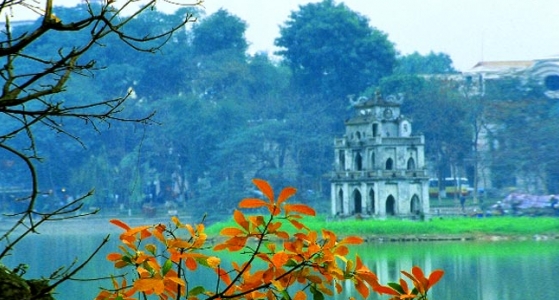
Perched on the banks of the Red River, Hanoi is Vietnam's capital and one of the world's most ancient cities. Its beauty lies in its liveliness of bustling streets where workshops and cafes spill out...
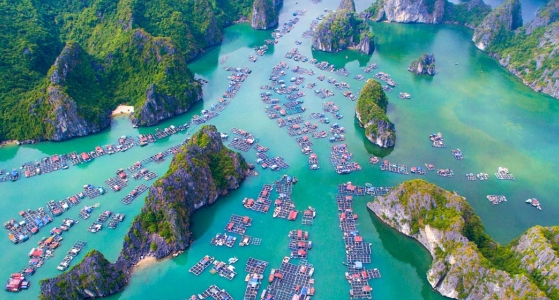
Halong Bay, listed as a UNESCO World Heritage Site in 1994, is located 170km east of Hanoi. It is made up of three neighboring bays: Halong, Lan Ha and Bai Tu Long bays, although Halong Bay is...
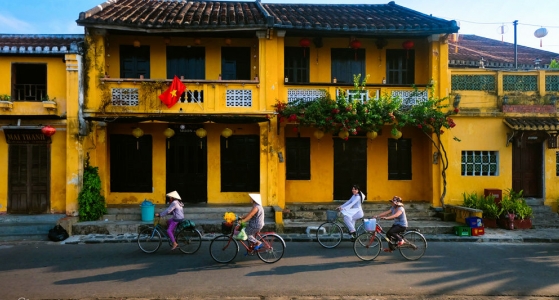
One of the oldest cities in Asia, Hoi An town is in central Vietnam and was declared a UNESCO World Heritage Site in 1999 thanks to its 800 historic buildings. Today, its iconic yellow ochre facades,...
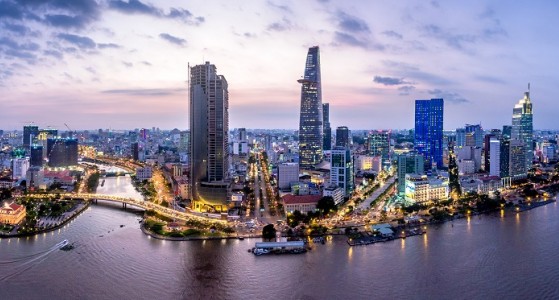
Commonly known as Saigon, Ho Chi Minh City in southern Vietnam is the country’s largest city and the financial and economical capital. This is a city full of surprises. Chaotic traffic blends with...
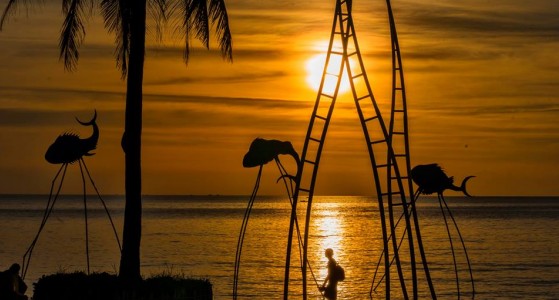
Phu Quoc, Kien Giang Province, is an idyllic emerald island with white powder beaches, turquoise waters and palm tree forests. It is located close to the coast of Cambodia in the Gulf of Thailand....
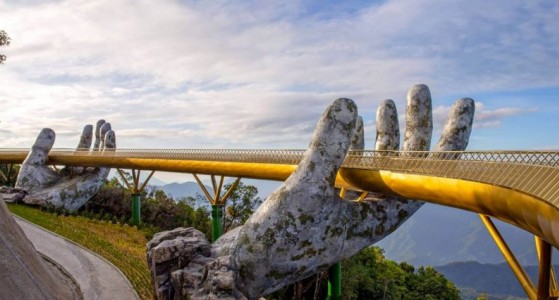
Da Nang is the commercial and educational center of central Vietnam and the largest city in the region. It is also the tourism hub on the west coast blessed with beautiful sunsets against a backdrop...
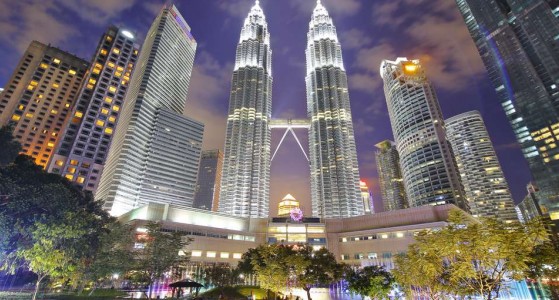
Kuala Lumpur is a diversity cultural melting pot, where jade-topped Chinese gates open out onto palm-lined squares, Indian restaurants serve banana leaf curries in marigold-scented alleyways, and...
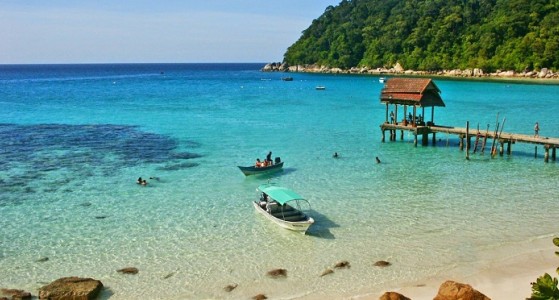
Penang is a state on the west coast of Peninsular Malaysia. Geographically, the state consists of Penang Island, and Seberang Perai, the mainland strip facing the island, which are separated by a...
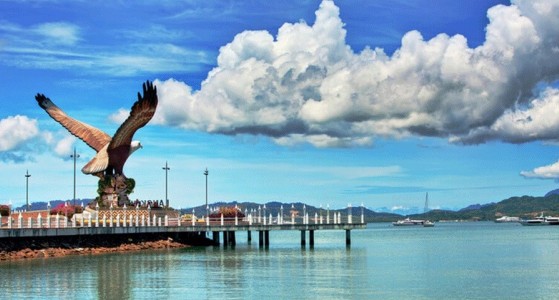
Langkawi is an archipelago of 99 islands in the Andaman Sea, 30 km off the mainland coast of Kedah state. It is a famous destination in Malaysia due to its natural white sand beaches, lush jungle...
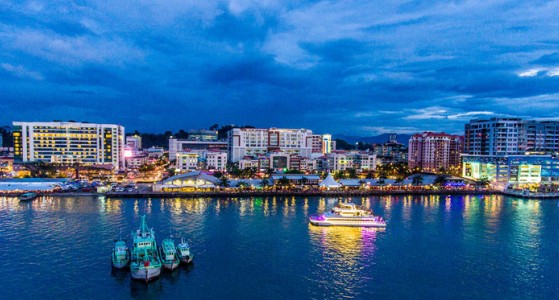
Kota Kinabalu is a small city located in Malaysian part of Borneo. Its coastal location and mountain backdrop give it one of the most spectacular settings of any city in the country. As a growing...
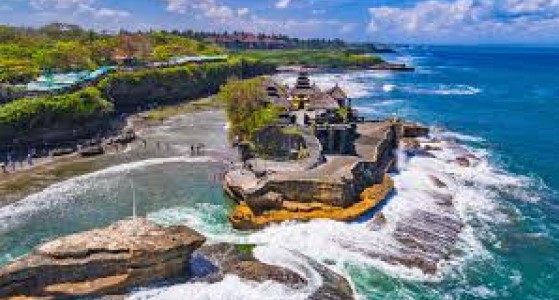
Bali, the famed Island of the Gods, is the most visited part of Indonesia. Its diverse landscape of mountainous terrain, rugged coastlines, sandy beaches, lush rice terraces and barren volcanic...
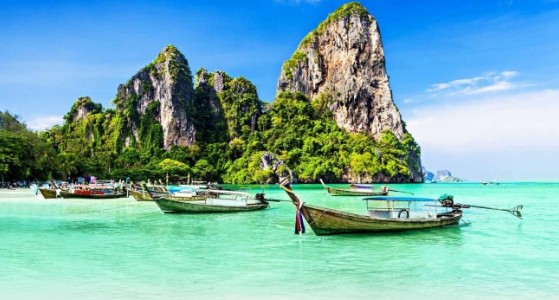
As the largest island in all of Thailand, Phuket has everything to offer within its coastline. From gorgeous beaches, delicious food, amazing natural parks, to access to some of the Andaman Sea’s...
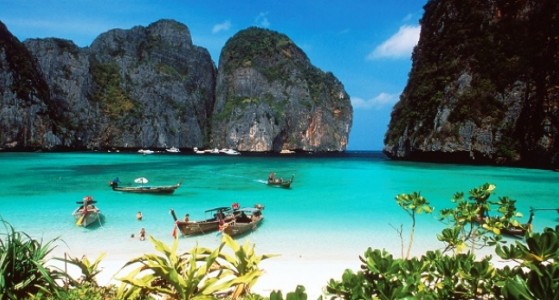
Krabi province that embraces both the mainland and some idyllic islands is characterised by unique limestone formations and lush vegetation. Its town with the same name is the main jump-off point for...
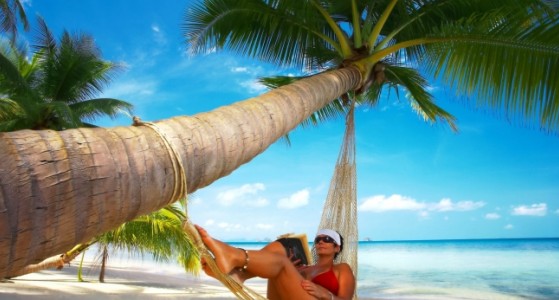
Koh Samui is the largest island in the Gulf of Thailand followed by its two smaller sisters – Koh Phangan and Koh Tao. There’s no moonsoon in the island makes it a destination for sunshine and...
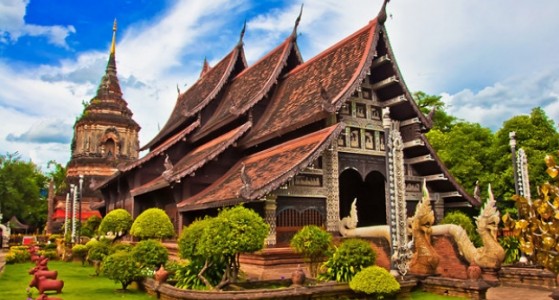
Fame as 'the rose of the North', Chiang Mai is an alluring city brimming with glittering temples, lush jungle, delicious streetfood and the bustle of lively markets. As the gateway to the mountains...
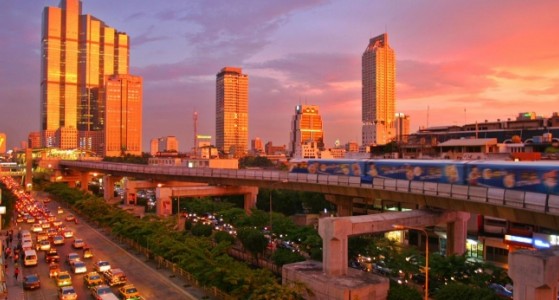
Buzzing, humid and energetic, Bangkok is the city where magnificent temples, historic markets, skyscrapers and rooftop bars create an intoxicating vibe that's hard to resist. The city is a...
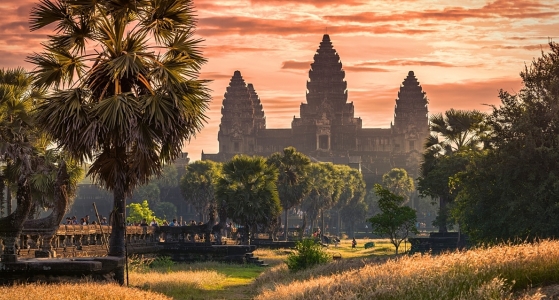
Siem Reap is the gateway to Cambodia’s vast and spectacular temples of Angkor undoubtedly one of the world's greatest archaeological sites. Constructed between the 9th and 15th centuries, these...

Perched on the banks of the Red River, Hanoi is Vietnam's capital and one of the world's most ancient cities. Its beauty lies in its liveliness of bustling streets where workshops and cafes spill out...

Halong Bay, listed as a UNESCO World Heritage Site in 1994, is located 170km east of Hanoi. It is made up of three neighboring bays: Halong, Lan Ha and Bai Tu Long bays, although Halong Bay is...

One of the oldest cities in Asia, Hoi An town is in central Vietnam and was declared a UNESCO World Heritage Site in 1999 thanks to its 800 historic buildings. Today, its iconic yellow ochre facades,...

Commonly known as Saigon, Ho Chi Minh City in southern Vietnam is the country’s largest city and the financial and economical capital. This is a city full of surprises. Chaotic traffic blends with...

Phu Quoc, Kien Giang Province, is an idyllic emerald island with white powder beaches, turquoise waters and palm tree forests. It is located close to the coast of Cambodia in the Gulf of Thailand....

Da Nang is the commercial and educational center of central Vietnam and the largest city in the region. It is also the tourism hub on the west coast blessed with beautiful sunsets against a backdrop...

Kuala Lumpur is a diversity cultural melting pot, where jade-topped Chinese gates open out onto palm-lined squares, Indian restaurants serve banana leaf curries in marigold-scented alleyways, and...

Penang is a state on the west coast of Peninsular Malaysia. Geographically, the state consists of Penang Island, and Seberang Perai, the mainland strip facing the island, which are separated by a...

Langkawi is an archipelago of 99 islands in the Andaman Sea, 30 km off the mainland coast of Kedah state. It is a famous destination in Malaysia due to its natural white sand beaches, lush jungle...

Kota Kinabalu is a small city located in Malaysian part of Borneo. Its coastal location and mountain backdrop give it one of the most spectacular settings of any city in the country. As a growing...

Bali, the famed Island of the Gods, is the most visited part of Indonesia. Its diverse landscape of mountainous terrain, rugged coastlines, sandy beaches, lush rice terraces and barren volcanic...

As the largest island in all of Thailand, Phuket has everything to offer within its coastline. From gorgeous beaches, delicious food, amazing natural parks, to access to some of the Andaman Sea’s...

Krabi province that embraces both the mainland and some idyllic islands is characterised by unique limestone formations and lush vegetation. Its town with the same name is the main jump-off point for...

Koh Samui is the largest island in the Gulf of Thailand followed by its two smaller sisters – Koh Phangan and Koh Tao. There’s no moonsoon in the island makes it a destination for sunshine and...

Fame as 'the rose of the North', Chiang Mai is an alluring city brimming with glittering temples, lush jungle, delicious streetfood and the bustle of lively markets. As the gateway to the mountains...

Buzzing, humid and energetic, Bangkok is the city where magnificent temples, historic markets, skyscrapers and rooftop bars create an intoxicating vibe that's hard to resist. The city is a...

Siem Reap is the gateway to Cambodia’s vast and spectacular temples of Angkor undoubtedly one of the world's greatest archaeological sites. Constructed between the 9th and 15th centuries, these...
Southeast Asia Family Tours & Travel Guide
Fantastic Foodie Destinations in Southeast Asia
Southeast Asia is a paradise for food lovers, offering an exceptional variety of flavors, textures, and culinary traditions. From savory street food to lavish feasts, the region is a delightful...
Traveling Thailand with Kids: Know Before You Go
Thailand, known for its stunning beaches, rich culture, and warm hospitality, is an excellent destination for families traveling with kids. From bustling cities to serene islands, this Southeast...
Island Hopping Bliss: Best Destinations in Southeast Asia
Southeast Asia beckons beach lovers and island hoppers with its unspoiled sandy beaches, glistening emerald waters, and enchanting cultures. Numerous islands make up this archipelago paradise, each...
Fantastic Foodie Destinations in Southeast Asia
Southeast Asia is a paradise for food lovers, offering an exceptional variety of flavors, textures, and culinary traditions. From savory street food to lavish feasts, the region is a delightful...
Traveling Thailand with Kids: Know Before You Go
Thailand, known for its stunning beaches, rich culture, and warm hospitality, is an excellent destination for families traveling with kids. From bustling cities to serene islands, this Southeast...
Island Hopping Bliss: Best Destinations in Southeast Asia
Southeast Asia beckons beach lovers and island hoppers with its unspoiled sandy beaches, glistening emerald waters, and enchanting cultures. Numerous islands make up this archipelago paradise, each...

Customize Southeast Asia Family Tours


Adventure Travel Trade Association


American Society of Travel Agents

Family Travel Association


TripAdvisor


Wikipedia


World Travel Awards
ABOUT US
Our storyTrusted Travel CompanyWhat Makes Us DifferentMeet Our TeamSoutheast Asia Travel GuideSoutheast Asia Tour HighlightsPre-departuresDeposit & PaymentCancellation PolicyTerms and ConditionsOur Destinations
Vietnam ToursCambodia ToursLaos ToursMyanmar ToursThailand ToursSingapore ToursIndonesia ToursMalaysia ToursPhilippines ToursWith over 15 years of experience in the tourism field, Southeast Asia Travel company has built a solid reputation as experts in designing custom tours across Southeast Asia: Vietnam, Laos, Cambodia, Thailand, Singapore, Malaysia, Indonesia, Myanmar, Philippines... Read more
